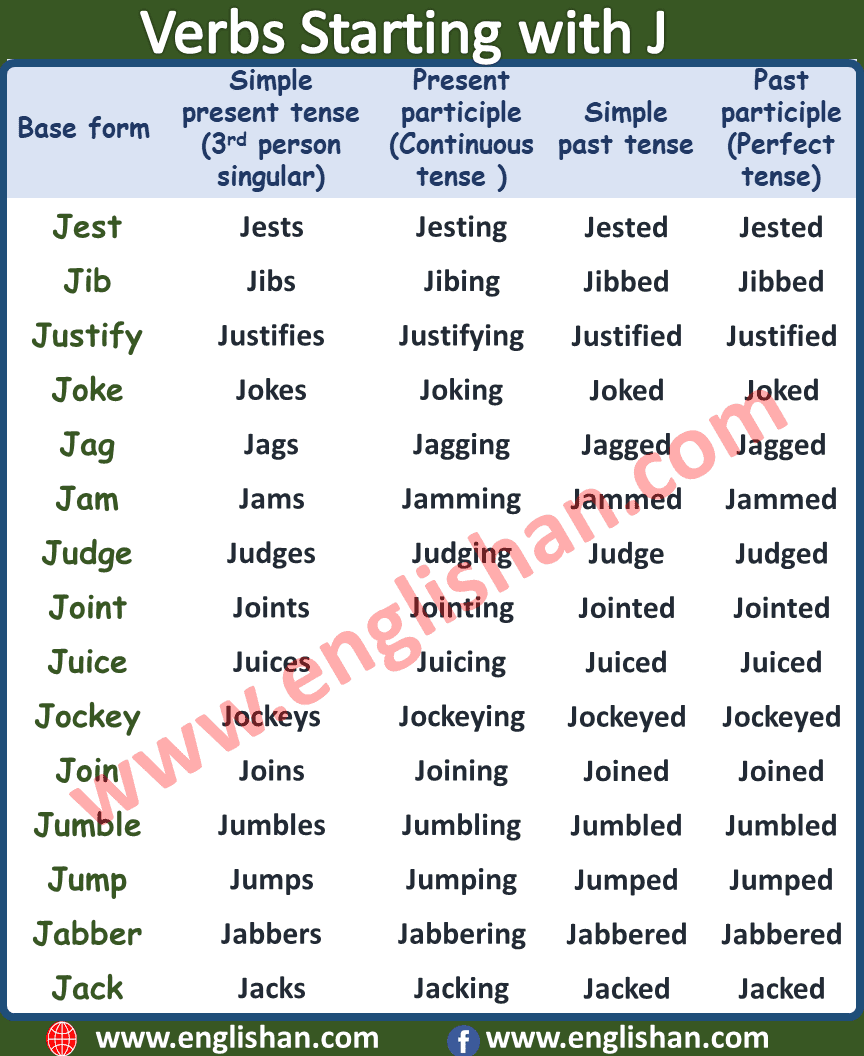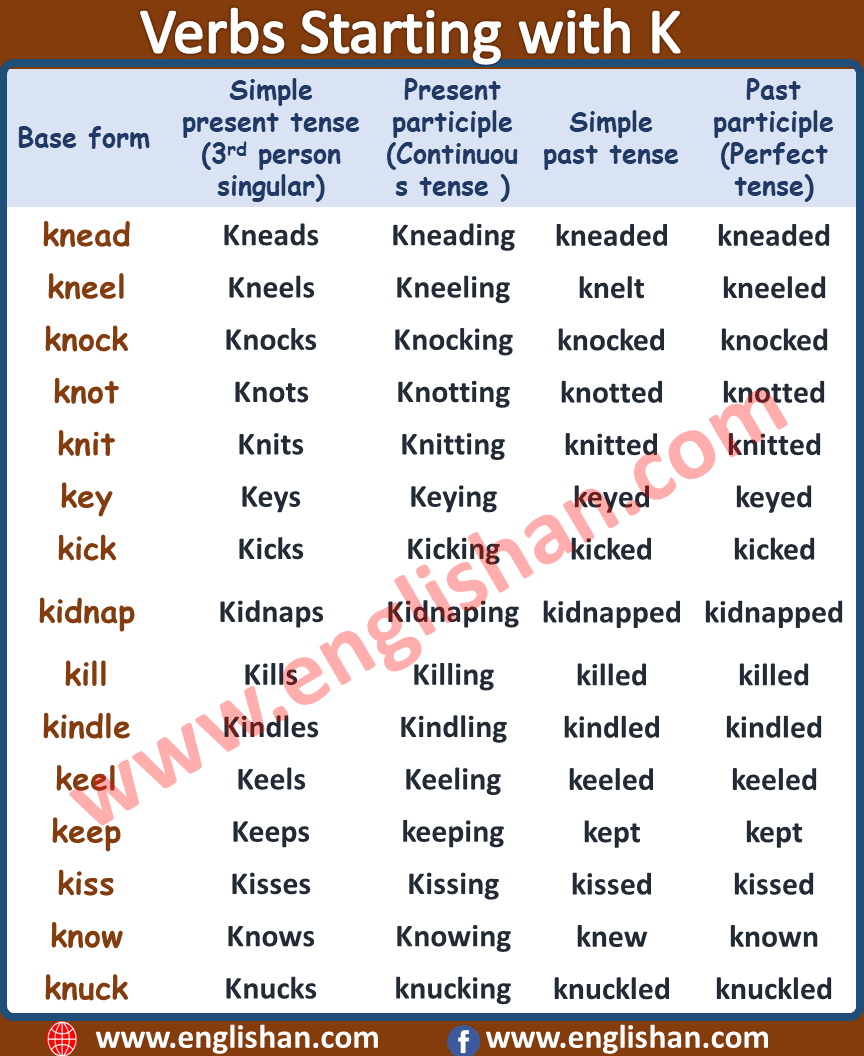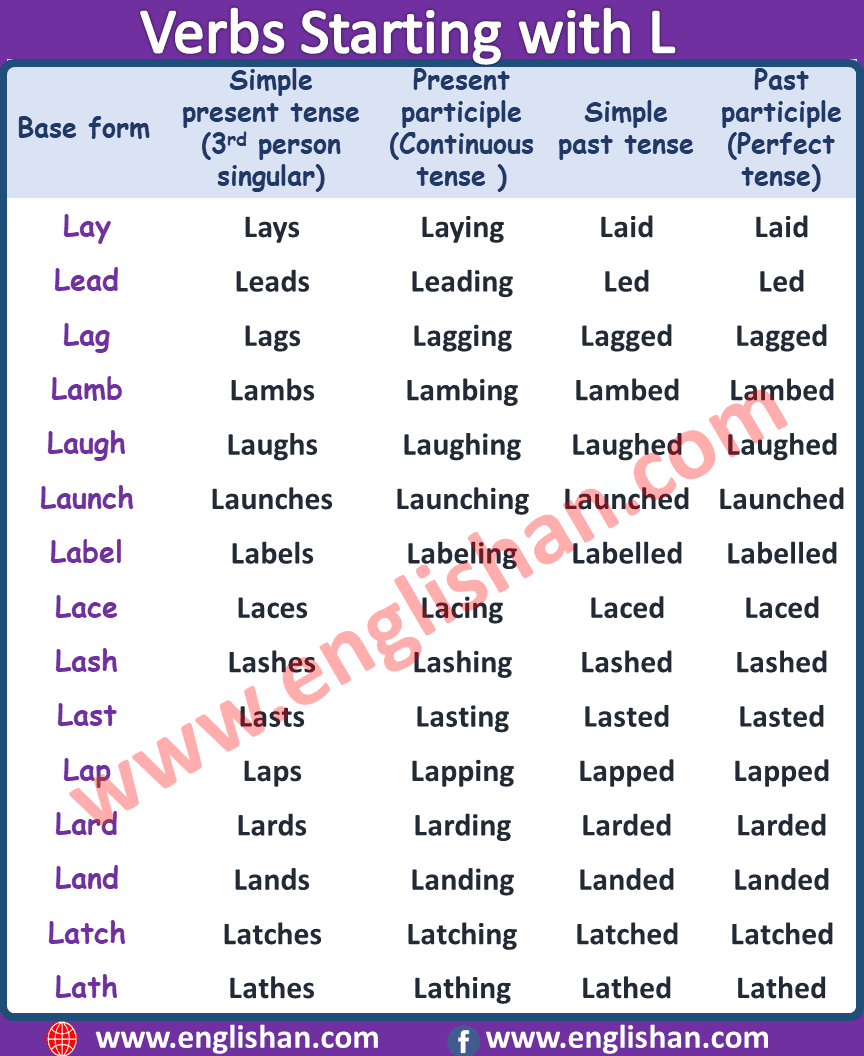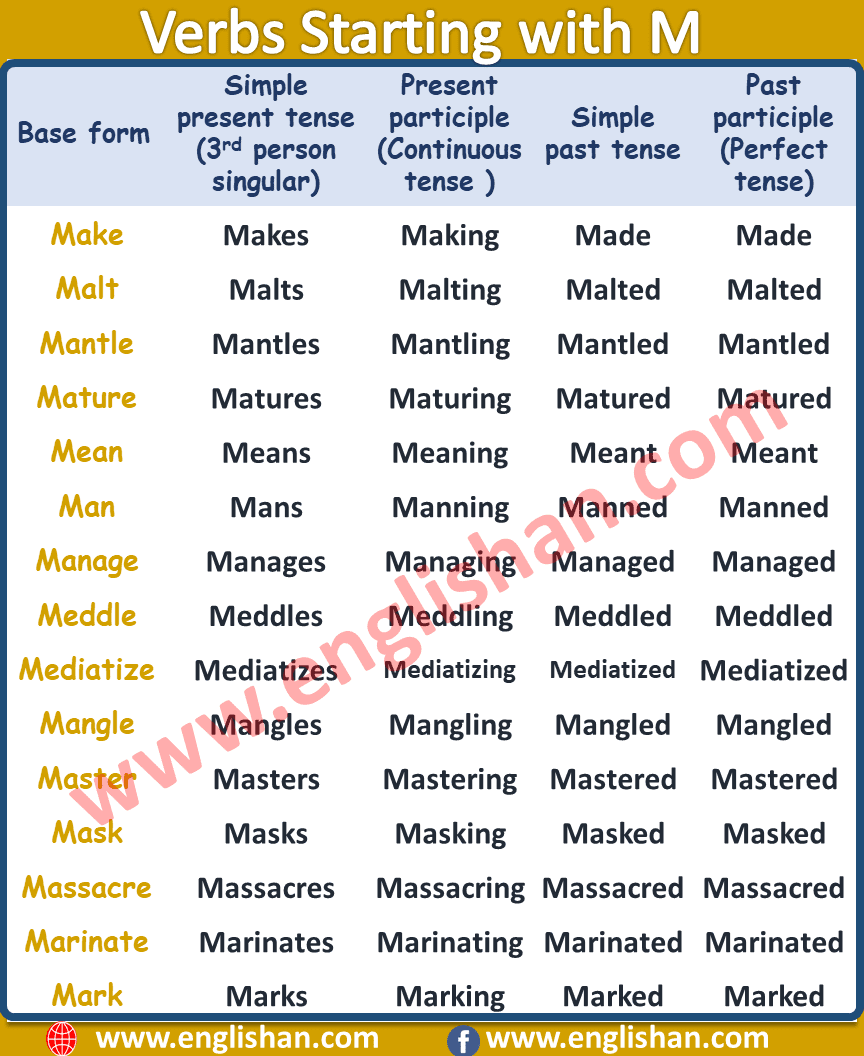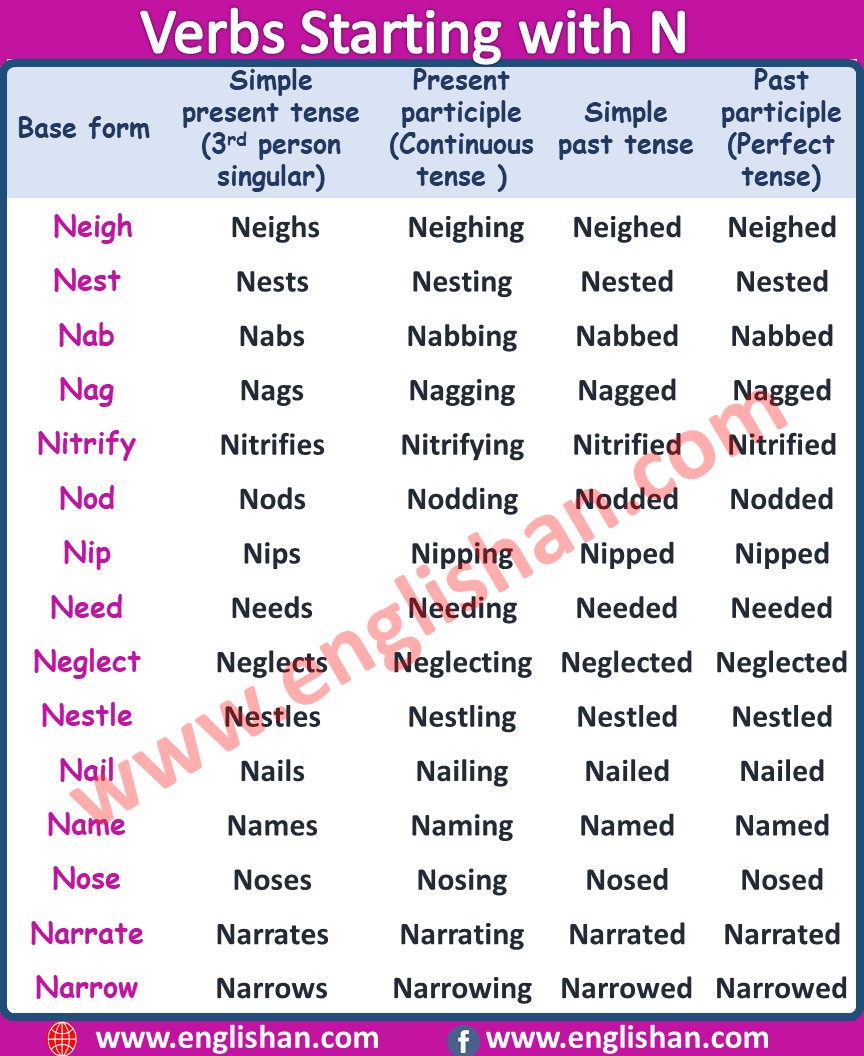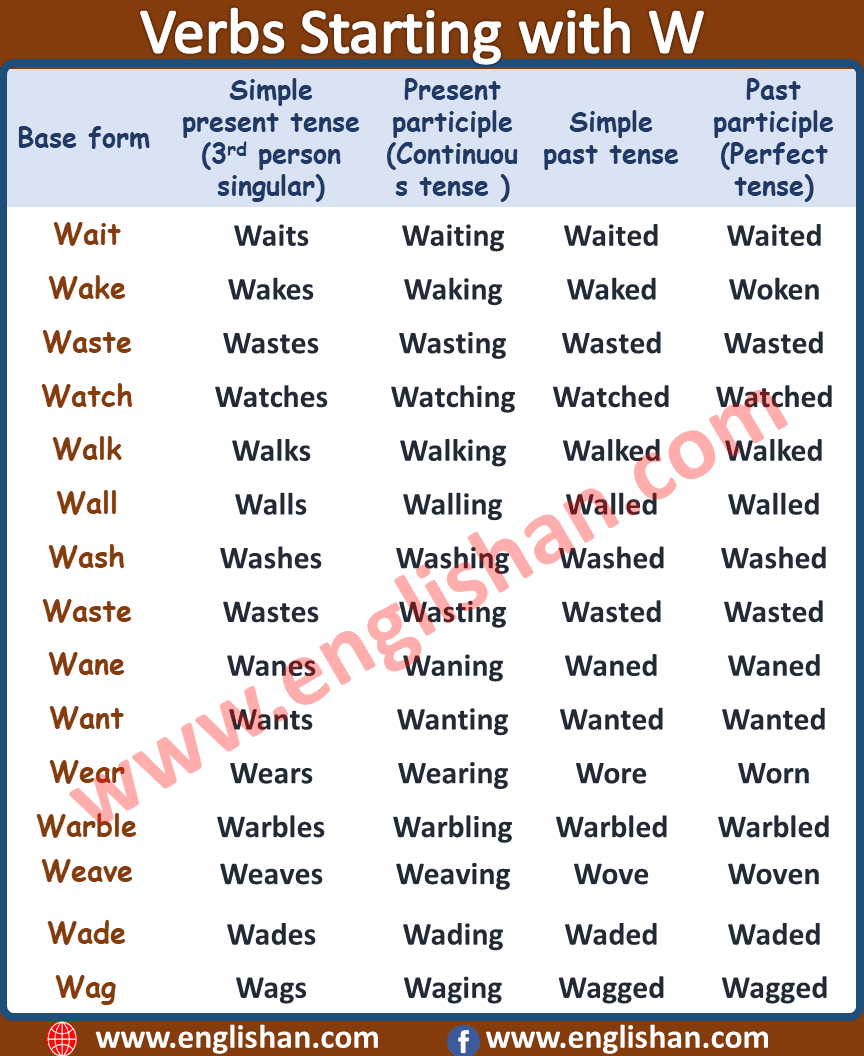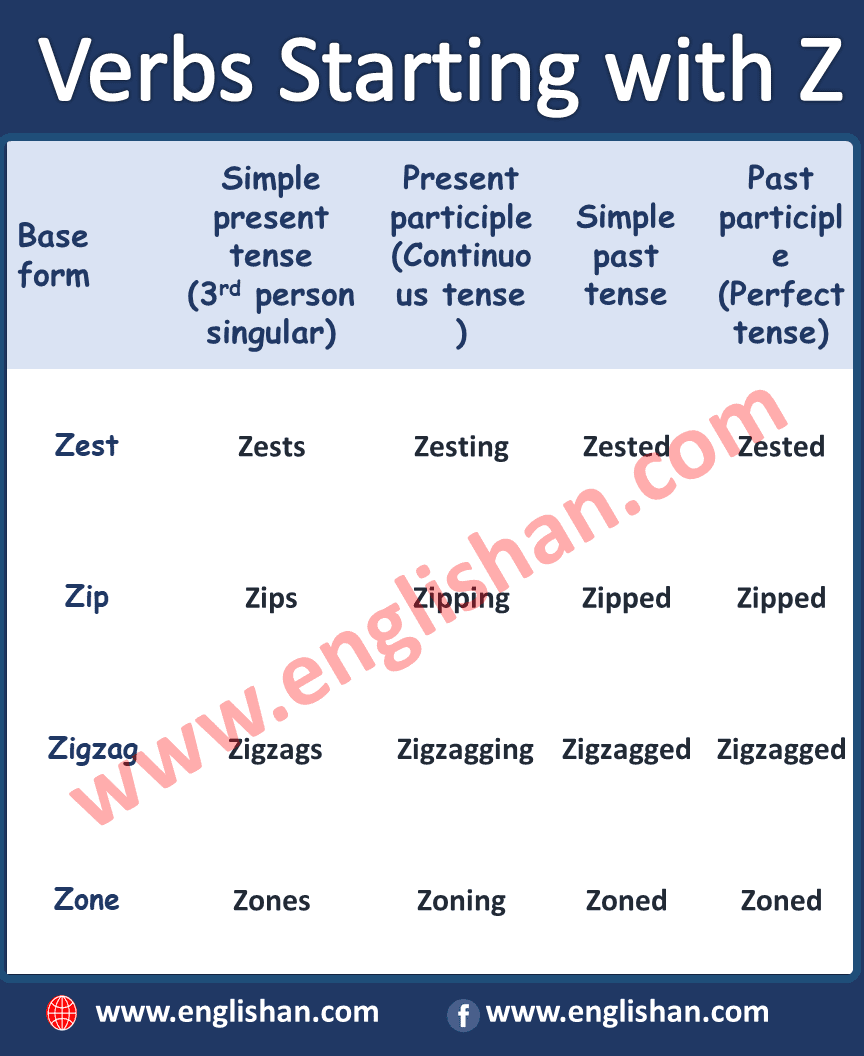Verbs are words which tell us the time of action in a sentence happened. The time that a verb shows is called tense.
| Present | Past | Past Participle |
| arise | arose | arisen |
| awake | awoke (or awaked) | awaked (or awoken) |
| bear (to give birth) | bore | born |
| beat | beat | beaten (or beat) |
| become | became | become |
| begin | began | begun |
| bet | bet | bet |
| bind | bound | bound |
| bite | bit | bitten |
| bleed | bled | bled |
| blow | blew | blown |
| break | broke | broken |
| breed | bred | bred |
| bring | brought | brought |
| burst | burst | burst |
| buy | bought | bought |
| cast | cast | cast |
| catch | caught | caught |
| choose | chose | chosen |
| come | came | come |
| cut | cut | cut |
| deal | dealt | dealt |
| dig | dug | dug |
| dive | dived (or dove) | dived |
| do | did | done |
| draw | drew | drawn |
| dream | dreamed (or dreamt) | dreamed (or dreamt) |
| drink | drank | drunk |
| drive | drove | driven |
| eat | ate | eaten |
| fall | fell | fallen |
| feed | fed | fed |
| feel | felt | felt |
| fight | fought | fought |
| find | found | found |
| flee | fled | fled |
| fly | flew | flown |
| forget | forgot | forgotten |
| forgive | forgave | forgiven |
| freeze | froze | frozen |
| get | got | got (or gotten) |
| give | gave | given |
| go | went | gone |
| grind | ground | ground |
| grow | grew | grown |
| hang (to execute) | hanged | hanged |
| have | had | had |
| hear | heard | heard |
| hide | hid | hidden |
| hit | hit | hit |
| hold | held | held |
| hurt | hurt | hurt |
| keep | kept | kept |
| know | knew | known |
| lay | laid | laid |
| lead | led | led |
| leave | left | left |
| lend | lent | lent |
| let | let | let |
| lie | lay | lain |
| light | lighted (or lit) | lighted (or lit) |
| lose | lost | lost |
| make | made | made |
| mean | meant | meant |
| meet | met | met |
| mistake | mistook | mistaken |
| pay | paid | paid |
| prove | proved | proved (or proven) |
| put | put | put |
| quit | quit | quit |
| read | read | read |
| ride | rode | ridden |
| ring | rang | rung |
| rise | rose | risen |
| run | ran | run |
| say | said | said |
| see | saw | seen |
| sell | sold | sold |
| send | sent | sent |
| set | set | set |
| shake | shook | shaken |
| shed | shed | shed |
| shoot | shot | shot |
| shut | shut | shut |
| sing | sang | sung |
| sink | sank | sunk |
| sit | sat | sat |
| slay | slew | slain |
| sleep | slept | slept |
| slide | slid | slide |
| sling | slung | slung |
| slink | slunk | slunk |
| speak | spoke | spoken |
| spend | spent | spent |
| spin | spun | spun |
| spit | spit (or spat) | spit (or spat) |
| split | split | split |
| spread | spread | spread |
| spring | sprang (or sprung) | sprung |
| stand | stood | stood |
| steal | stole | stolen |
| stick | stuck | stuck |
| stink | stank (or stunk) | stunk |
| stride | strode | stridden |
| strike | struck | struck |
| string | strung | strung |
| strive | strove (or strived) | striven (or strived) |
| swear | swore | sworn |
| sweep | swept | swept |
| swell | swelled | swelled (or swollen) |
| swim | swam | swum |
| swing | swung | swung |
| take | took | taken |
| teach | taught | taught |
| tear | tore | torn |
| tell | told | told |
| think | thought | thought |
| thrive | throve (or thrived) | throve (or thriven) |
| throw | threw | thrown |
| thrust | thrust | thrust |
| wake | woke (or waked) | waked (or woken) |
| win | won | won |
| wind | wound | wound |
| wring | wring | wrung |
| write | wrote | written |
Verb forms of Verb To be
| Present tense | Past tense | Future tense |
| is/ am/ are | was/ were | will/shall |
Now let’s use the words from the above list and understand how different forms of verbs are formed using the root word.
- We usually make the past tense by adding “d” or “ed” to the verb root word. Some verbs have irregular past tenses. We do not add “d” or “ed” to the irregular past tense verb, but change the spelling. grow becomes grew not growed.
- We make the present tense by using the verb root word or the verb “to be”, am and an “ing” word eg: walk -> walking.
- We make the future tense by using the verb “to be” and the verb root word. Will / Shall is the verb “to be”.
| Root word | Past tense | Present tense | Future tense |
| Walk | I walked. | I walk. | I will walk. |
| Help | I helped. | I help. | I will help. |
| Learn | I learned. | I learn. | I will learn. |
| Write | I wrote | I write | I shall write |
| grow | It grew | It grows | It will grow |
Keep exploring EnglishBix for quality resources on three forms of verbs and learn how they are used.
By Jacqueline Schaalje
Fly Flew - Katmary
A student of mine asked me for a list of common verbs, with their past forms, because he keeps getting confused.
Here is the list that I made for him. You could find this useful too.
Common verbs that are regular:
| Present | Past |
| Talk | Talked |
| Walk | Walked |
| Work | Worked |
| Decide | Decided |
| Call | Called |
| Phone | Phoned |
| Cook | Cooked |
| Wait | Waited |
| Serve | Served |
| Arrive | Arrived |
| Want | Wanted |
| Dance | Danced |
| Look | Looked |
| Help | Helped |
| Touch | Touched |
| Listen | Listened |
| Learn | Learnt (Br.), Learned (Am.) |
| Study | Studied |
| Rent | Rented |
| Show | Showed |
| Sign | Signed |
| Live | Lived |
| Love | Loved |
| Like | Liked |
| Surf (the internet or the sea) | Surfed |
| Suggest | Suggested |
| Offer | Offered |
| Receive | Received |
| Visit | Visited |
| Carry | Carried |
| Reserve | Reserved |
| Book | Booked |
| Plan | Planned |
| Start | Started |
| End | Ended |
| Need | Needed |
| Create | Created |
| Explain | Explained |
| Ask | Asked |
| Answer | Answered |
| Open | Opened |
| Close | Closed |
Common irregular verbs:
| Present | Past |
| Run | Ran |
| Meet | Met |
| Speak | Spoke |
| Say | Said |
| Tell | Told |
| Can | Could |
| Swim | Swam |
| Leave | Left |
| Go | Went |
| Be (am, is, are) | Was, were |
| Have (has) | Had |
| Drink | Drank |
| Eat | Ate |
| Come | Came |
| Sit | Sat |
| Stand | Stood |
| Understand | Understood |
| See | Saw |
| Feel | Felt |
| Write | Wrote |
| Read | Read |
| Cut | Cut |
| Buy | Bought |
| Pay | Paid |
| Fall | Fell |
| Fight | Fought |
| Get | Got |
| Give | Gave |
| Send | Sent |
| Begin | Began |
| Sell | Sold |
| Make | Made |
| Know | Knew |
| Put | Put |
| Fly | Flew |
Check out these articles about present simple and past simple, if you like.
To practise, do this quiz.
Quiz Present and Past
Click here to do this quiz online.
Choose a verb from the lists in this article. You can use the present or the past. You can use negatives.
1 Our company ____________ graphic designs.
2 One day we ____________ a new logo to a client.
3 The client ____________ me on the phone later that day.
4 “I _____________ my logo,” she said.
5 “Oh, did you __________ my email?” I asked.
6 “Yes, but there ___________ nothing in the email,” the client said. “Only words.”
7 I sent the logo again, and two minutes after that I __________ with the client again.
8 “Now do you ____________ the logo?” I asked.
9 “Sorry, I __________ anything,” said the client.
10 “You __________ to click on it,” I said.
11 “Click on what?” she ___________, completely surprised.
12 “You should click on the attachment,” I ____________.
13 It was the first time my client ___________ a file!
Want to do more quizzes? You can order more here.
http://englishwithasmile.net/order/
Common Verbs Forms List A to Z! In this lesson, you will learn about five different forms of verbs. This list of verbs is very important to understand different aspects of verbs. We are going to discuss 5 different forms of verbs, Base form, Simple present tense, Present participle, Simple past tense, and Past participle. Here is the list of three forms of verbs in English.
Before going towards the verbs forms list a to z, Let us understand these five forms of verbs with their definitions, this will make your learning easy and interesting.
-Base Form
It is basically the root form of a verb. This is the most simple verb form, without any -ed or -ing addition.
-Simple Present Tense
The simple present tense form is basically used in present indefinite tense, it is basically the root form of the verb with the addition of s or es at the end when we have a third singular person as an object.
-Present Participle
You will find the present particle form in the continuous tense. Mostly in present continuous tense, it is simply formed by adding -ing at the end of the root form of the verb.
-Simple Past Tense
It can be a little complicated, not simple like present participle (adding -ing at the end of root form), it is formed by adding -ed at the end of a regular verb, but in the case of irregular verbs we can’t just add -ed, their case is different.
-Past Participle
It is in the case of the perfect tense, we use past participle form in the perfect tense, It is formed by simply adding -ed at the end of the base form or root form in the case of a regular verb. For irregular verbs, we have to memorize each form they don’t follow any pattern.
Common Verbs Forms List A to Z
Below are verbs forms list a to z:
Verb Starting with A
| Base form | Simple present tense | Present participle | Simple past tense | Past participle |
| Abide | Abides | Abiding | Abode | Abode |
| Abuse | Abuses | Abusing | Abused | Abused |
| Accuse | Accuses | Accusing | Accused | Accused |
| Advise | Advises | Advising | Advised | Advised |
| Agree | Agrees | Agreeing | Agreed | Agreed |
| Allow | Allows | Allowing | Allowed | Allowed |
| Answer | Answers | Answering | Answered | Answered |
| Appear | Appears | Appearing | Appeared | Appeared |
| Apply | Applies | Applying | Applied | Applied |
| Appoint | Appoints | Appointing | Appointed | Appointed |
| Argue | Argues | Arguing | Argued | Argued |
| Arise | Arises | Arising | Arose | Arisen |
| Arrive | Arrives | Arriving | Arrived | Arrived |
| Attend | Attends | Attending | Attended | Attended |
| Awake | Awakes | Awaking | Awoke | Awoke |
Verb Starting with B
| Base form | Simple present tense | Present Participle | Simple past tense | Past participle |
| Bail | Bails | Bailing | Bailed | Bailed |
| Bear | Bears | Bearing | Bore | Born |
| Beat | Beats | Beating | Beat | Beaten |
| Become | Becomes | Becoming | Became | Become |
| Begin | Begins | Beginning | Began | Begun |
| Bid | Bids | Biding | Bade | Bidden |
| Bid | Bids | Biding | Bid | Bid |
| Bind | Binds | Binding | Bound | Bound |
| Bite | Bites | Biting | Bit | Bitten |
| Bleed | Bleeds | Bleeding | Bled | Bled |
| Blow | Blows | Blowing | Blew | Blown |
| Break | Breaks | Breaking | Broke | Broken |
| Breed | Breeds | Breeding | Bred | Bred |
| Bring | Brings | Bringing | Brought | Brought |
| Burn | Burns | Burning | Burnt | Burnt |
Verb Starting with C
| Base form | Simple present tense | Present participle | Simple past tense | Past participle |
| Calcify | Calcifies | Calcifying | Calcified | Calcified |
| Catch | Catches | Catching | Caught | Caught |
| Cheat | Cheats | Cheating | Cheated | Cheat |
| Choose | Chooses | Choosing | Chose | Chosen |
| Cleave | Cleaves | Cleaving | Cleft | Cleft |
| Climb | Climbs | Climbing | Climbed | Climbed |
| Cling | Clings | Clinging | Clung | Clung |
| Come | Comes | Coming | Came | Come |
| Compare | Compares | Comparing | Compared | Compared |
| Conceal | Conceals | Concealing | Concealed | Concealed |
| Consult | Consults | Consulting | Consulted | Consulted |
| Cost | Costs | Costing | Cost | Cost |
| Creep | Creeps | Creeping | Crept | Crept |
| Cross | Crosses | Crossing | Crossed | Crossed |
| Cry | Cries | Crying | Cried | Cried |
Verb Starting with D
| Base form | Simple present tense | Present participle | Simple past tense | Past participle |
| Dare | Dares | Daring | Dared | Dared |
| Deal | Deals | Dealing | Dealt | Dealt |
| Deal | Deals | Dealing | Dealt | Dealt |
| Defeat | Defeats | Defeating | Defeated | Defeated |
| Devote | Devotes | Devoting | Devoted | Devoted |
| Die | Dies | Dying | Died | Died |
| Dig | Digs | Digging | Dug | Dug |
| Direct | Directs | Directing | Directed | Directed |
| Draw | Draws | Drawing | Drew | Drawn |
| Dream | Dreams | Dreaming | Dreamt | Dreamt |
| Drink | Drinks | Drinking | Drank | Drunk |
| Drive | Drives | Driving | Drove | Driven |
| Drown | Drowns | Drowning | Drowned | Drowned |
| Dry | Dries | Drying | Dried | Dried |
| Dwell | Dwells | Dwelling | Dwelt | Dwelt |
Verb Starting with E
| Base form | Simple present tense | Present participle | Simple past tense | Past participle |
| Earn | Earns | Earning | Earned | Earned |
| Ease | Eases | Easing | Ease | Ease |
| Eat | Eats | Eating | Ate | Eaten |
| Ebb | Ebbs | Ebbing | Ebbed | Ebbed |
| Echo | Echoes | Echoing | Echoed | Echoed |
| Eclipse | Eclipses | Eclipsing | Eclipsed | Eclipsed |
| Edify | Edifies | Edifying | Edified | Edified |
| Edify | Edifies | Edifying | Edified | Edified |
| Edit | Edits | Editing | Edited | Edited |
| Effect | Effects | Effecting | Effected | Effected |
| Eject | Ejects | Ejecting | Ejected | Ejected |
| Elect | Elects | Electing | Elected | Elected |
| Enter | Enters | Entering | Entered | Entered |
| Escape | Escapes | Escaping | Escaped | Escaped |
| Evade | Evades | Evading | Evaded | Evaded |
Verb Starting with F
| Base form | Simple present tense | Present participle | Simple past tense | Past participle |
| Face | Faces | Facing | Faced | Faced |
| Fail | Fails | Failing | Failed | Failed |
| Fake | Fakes | Faking | Faked | Faked |
| Fall | Falls | Falling | Fell | Fallen |
| Fear | Fears | Fearing | feared | Feared |
| Feed | Feeds | Feeding | Fed | Fed |
| Feel | Feels | Feeling | Felt | Felt |
| Fight | Fights | Fighting | Fought | Fought |
| Find | Finds | Finding | Found | Found |
| Fine | Fines | Fining | Fined | Fined |
| Flee | Flees | Fleeing | Fled | Fled |
| float | floats | floating | Floated | Floated |
| Fly | Flies | Flying | Flew | Flown |
| Fold | Folds | Folding | Folded | Folded |
| Forbid | Forbids | Forbidding | Forbade | Forbidden |
Verb Starting with G
| Base form | Simple present tense | Present participle | Simple past tense | Past participle |
| Gag | Gags | Gaging | Gagged | Gagged |
| Gain | Gains | Gaining | Gained | Gained |
| Gamble | Gambles | Gambling | Gambled | Gambled |
| Gather | Gathers | Gathering | Gathered | Gathered |
| Gaze | Gazes | Gazing | Gazed | Gazed |
| Get | Gets | Getting | Got | Gotten |
| Gild | Gilds | Gilding | Gilt | Gilt |
| Gird | Girds | Girding | Gridded | Gridded |
| Give | Gives | Giving | Gave | Given |
| Glance | Glances | Glancing | Glanced | Glanced |
| Go | Goes | Going | Went | Gone |
| Grant | Grants | Granting | Granted | Granted |
| Grind | Grinds | Grinding | Ground | Ground |
| Grip | Grips | Griping | Gripped | Gripped |
| Grow | Grows | Growing | Grew | Grown |
Verb Starting with H
| Base form | Simple present tense | Present participle |
Simple past tense | Past participle |
| Hack | Hacks | Hacking | Hacked | Hacked |
| Hang | Hangs | Hanging | Hung | Hung |
| Hang | Hangs | Hanging | Hanged | Hanged |
| Harass | Harasses | Harassing | Harassed | Harassed |
| Hatch | Hatches | Hatching | Hatch | Hatch |
| Hate | Hates | Hating | Hated | Hate |
| Have | Has | Having | Had | Had |
| Hear | Hears | Hearing | Heard | Heard |
| Help | Helps | Helping | Helped | Helped |
| Hew | Hews | Hewing | Hewed | Hewed |
| Hide | Hides | Hiding | Hid | Hidden |
| Hit | Hits | Hitting | Hit | Hit |
| Hold | Holds | Holding | Held | Held |
| Hunt | Hunts | Hunting | Hunted | Hunted |
| Hurt | Hurts | Hurting | Hurt | Hurt |
Verb Starting with I
| Base form | Simple present tense | Present participle |
Simple past tense | Past participle |
| Ice | Ices | Icing | Iced | Iced |
| Idealize | Idealizes | Idealizing | Idealized | Idealized |
| Identify | Identifies | Identifying | Identified | Identified |
| Idle | Idles | Idling | Idled | Idled |
| Idolize | Idolizes | Idolizing | Idolized | Idolized |
| Ignite | Ignites | Igniting | Ignited | Ignited |
| Ignore | Ignores | Ignoring | Ignored | Ignored |
| Illtreat | Illtreats | Illtreating | Illtreated | Illtreated |
| Imagine | Imagines | Imagining | Imagined | Imagined |
| Imitate | Imitates | Imitating | Imitated | Imitated |
| Improvise | Improvises | Improvising | Improvised | Improvised |
| Impute | Imputes | Imputing | Imputed | Imputed |
| Incise | Incises | Incising | Incised | Incised |
| Incline | Inclines | Inclining | Inclined | Inclined |
| Include | Includes | Including | Included | Included |
Verb Starting with J
| Base form | Simple present tense | Present participle |
Simple past tense | Past participle |
| Jabber | Jabbers | Jabbering | Jabbered | Jabbered |
| Jack | Jacks | Jacking | Jacked | Jacked |
| Jag | Jags | Jagging | Jagged | Jagged |
| Jam | Jams | Jamming | Jammed | Jammed |
| Jest | Jests | Jesting | Jested | Jested |
| Jib | Jibs | Jibing | Jibbed | Jibbed |
| Jockey | Jockeys | Jockeying | Jockeyed | Jockeyed |
| Join | Joins | Joining | Joined | Joined |
| Joint | Joints | Jointing | Jointed | Jointed |
| Joke | Jokes | Joking | Joked | Joked |
| Judge | Judges | Judging | Judge | Judged |
| Juice | Juices | Juicing | Juiced | Juiced |
| Jumble | Jumbles | Jumbling | Jumbled | Jumbled |
| Jump | Jumps | Jumping | Jumped | Jumped |
| Justify | Justifies | Justifying | Justified | Justified |
Verb Starting with K
| Base form | Simple present tense | Present participle | Simple past tense | Past participle |
| keel | Keels | Keeling | keeled | keeled |
| keep | Keeps | keeping | kept | kept |
| key | Keys | Keying | keyed | keyed |
| kick | Kicks | Kicking | kicked | kicked |
| kidnap | Kidnaps | Kidnaping | kidnapped | kidnapped |
| kill | Kills | Killing | killed | killed |
| kindle | Kindles | Kindling | kindled | kindled |
| kiss | Kisses | Kissing | kissed | kissed |
| knead | Kneads | Kneading | kneaded | kneaded |
| kneel | Kneels | Kneeling | knelt | kneeled |
| knit | Knits | Knitting | knitted | knitted |
| knock | Knocks | Knocking | knocked | knocked |
| knot | Knots | Knotting | knotted | knotted |
| know | Knows | Knowing | knew | known |
| knuck | Knucks | knuckling | knuckled | knuckled |
Verb Starting with L
| Base form | Simple present tense | Present participle | Simple past tense | Past participle |
|---|---|---|---|---|
| Label | Labels | Labeling | Labeled | Labeled |
| Lace | Laces | Lacing | Laced | Laced |
| Lag | Lags | Lagging | Lagged | Lagged |
| Lamb | Lambs | Lambing | Lambed | Lambed |
| Land | Lands | Landing | Landed | Landed |
| Lap | Laps | Lapping | Lapped | Lapped |
| Lard | Lards | Larding | Larded | Larded |
| Lash | Lashes | Lashing | Lashed | Lashed |
| Last | Lasts | Lasting | Lasted | Lasted |
| Latch | Latches | Latching | Latched | Latched |
| Lath | Lathes | Lathing | Lathed | Lathed |
| Laugh | Laughs | Laughing | Laughed | Laughed |
| Launch | Launches | Launching | Launched | Launched |
| Lay | Lays | Laying | Laid | Laid |
| Lead | Leads | Leading | Led | Led |
Verb Starting with M
| Base form | Simple present tense | Present participle |
Simple past tense | Past participle |
| Make | Makes | Making | Made | Made |
| Malt | Malts | Malting | Malted | Malted |
| Man | Mans | Manning | Manned | Manned |
| Manage | Manages | Managing | Managed | Managed |
| Mangle | Mangles | Mangling | Mangled | Mangled |
| Mantle | Mantles | Mantling | Mantled | Mantled |
| Marinate | Marinates | Marinating | Marinated | Marinated |
| Mark | Marks | Marking | Marked | Marked |
| Mask | Masks | Masking | Masked | Masked |
| Massacre | Massacres | Massacring | Massacred | Massacred |
| Master | Masters | Mastering | Mastered | Mastered |
| Mature | Matures | Maturing | Matured | Matured |
| Mean | Means | Meaning | Meant | Meant |
| Meddle | Meddles | Meddling | Meddled | Meddled |
| Mediatize | Mediatizes | Mediatizing | Mediatized | Mediatized |
Verb Starting with N
|
Base form |
Simple present tense | Present participle | Simple past tense | Past participle |
| Nab | Nabs | Nabbing | Nabbed | Nabbed |
| Nag | Nags | Nagging | Nagged | Nagged |
| Nail | Nails | Nailing | Nailed | Nailed |
| Name | Names | Naming | Named | Named |
| Narrate | Narrates | Narrating | Narrated | Narrated |
| Narrow | Narrows | Narrowing | Narrowed | Narrowed |
| Need | Needs | Needing | Needed | Needed |
| Neglect | Neglects | Neglecting | Neglected | Neglected |
| Neigh | Neighs | Neighing | Neighed | Neighed |
| Nest | Nests | Nesting | Nested | Nested |
| Nestle | Nestles | Nestling | Nestled | Nestled |
| Nip | Nips | Nipping | Nipped | Nipped |
| Nitrify | Nitrifies | Nitrifying | Nitrified | Nitrified |
| Nod | Nods | Nodding | Nodded | Nodded |
| Nose | Noses | Nosing | Nosed | Nosed |
Verb Starting with O
| Base form | Simple present tense | Present participle | Simple past tense | Past participle |
| Obey | Obeys | Obeying | Obeyed | Obeyed |
| Object | Objects | Objecting | Objected | Objected |
| Objectify | Objectifies | Objectifying | Objectified | Objectified |
| Oblige | Obliges | Obliging | Obliged | Obliged |
| Observe | Observes | Observing | Observed | Observed |
| Obtain | Obtains | Obtaining | Obtained | Obtained |
| Occur | Occurs | Occurring | Occurred | Occurred |
| Offend | Offends | Offending | Offended | Offended |
| Officiate | Officiates | Officiating | Officiated | Officiated |
| Ogle | Ogles | Ogling | Ogled | Ogled |
| Oil | Oils | Oiling | Oiled | Oiled |
| Open | Opens | Opening | Opened | Opened |
| Operate | Operates | Operating | Operated | Operated |
| Order | Orders | Ordering | Ordered | Ordered |
| Owe | Owes | Owing | Owed | Owed |
Verb Starting with P
| Base form | Simple present tense | Present participle |
Simple past tense | Past participle |
| Pace | Paces | Pacing | Paced | Paced |
| Pacify | Pacifies | Pacifying | Pacified | Pacified |
| Pack | Packs | Packing | Packed | Packed |
| Pad | Pads | Padding | Padded | Padded |
| Paddle | Paddles | Paddling | Paddled | Paddled |
| Paint | Paints | Painting | Painted | Painted |
| Pair | Pairs | Pairing | Paired | Paired |
| Pamper | Pampers | Pampering | Pampered | Pampered |
| Paper | Papers | Papering | Papered | Papered |
| Parade | Parades | Parading | Paraded | Paraded |
| Pare | Pares | Paring | Pared | Pared |
| Park | Parks | Parking | Parked | Parked |
| Participate | Participates | Participating | Participated | Participated |
| Partition | Partitions | Partitioning | Partitioned | Partitioned |
| Patch | Patches | Patching | Patched | Patched |
Verb Starting with Q
| Base form | Simple present tense | Present participle | Simple past tense | Past participle |
| Quack | Quacks | Quacking | Quacked | Quacked |
| Quadruple | Quadruples | Quadrupling | Quadrupled | Quadrupled |
| Qualify | Qualifies | Qualifying | Qualified | Qualified |
| Quarter | Quarters | Quartering | Quartered | Quartered |
| Quaver | Quavers | Quavering | Quavered | Quavered |
| Quell | Quells | Quelling | Quelled | Quelled |
| Quench | Quenches | Quenching | Quenched | Quenched |
| Question | Questions | Questioning | Questioned | Questioned |
| Quibble | Quibbles | Quibbling | Quibbled | Quibbled |
| Quicken | Quickens | Quickening | Quickened | Quickened |
| Quilt | Quilts | Quilting | Quilted | Quilted |
| Quintuple | Quintuples | Quintupling | Quintupled | Quintupled |
| Quit | Quits | Quitting | Quit | Quit |
| Quiver | Quivers | Quivering | Quivered | Quivered |
| Quote | Quotes | Quoting | Quoted | Quoted |
Verb Starting with R
| Base form | Simple present tense | Present participle | Simple past tense | Past participle |
| Race | Races | Racing | Raced | Raced |
| Rack | Racks | Racking | Racked | Racked |
| Rage | Rages | Raging | Raged | Raged |
| Raid | Raids | Raiding | Raided | Raided |
| Rain | Rains | Raining | Rained | Rained |
| Raise | Raises | Raising | Raised | Raised |
| Rake | Rakes | Raking | Raked | Raked |
| Ramble | Rambles | Rambling | Rambled | Rambled |
| Ramp | Ramps | Ramping | Ramped | Ramped |
| Ransack | Ransacks | Ransacking | Ransacked | Ransacked |
| Redo | Redoes | Redoing | Redid | Redone |
| Redraw | Redraws | Redrawing | Redrew | Redrawn |
| Reduce | Reduces | Reducing | Reduced | Reduced |
| Reek | Reeks | Reeking | Reeked | Reeked |
| Reel | Reels | Reeling | Reeled | Reeled |
Verb Starting with S
| Base form | Simple present tense | Present participle |
Simple past tense | Past participle |
| Sail | Sails | Sailing | Sailed | Sailed |
| Satisfy | Satisfies | Satisfying | Satisfied | Satisfied |
| Save | Saves | Saving | Saved | Saved |
| Saw | Saws | Sawing | Sawed | Sawn |
| Say | Says | Saying | Said | Said |
| Scald | Scalds | Scalding | Scalded | Scalded |
| Scale | Scales | Scaling | Scaled | Scaled |
| Scare | Scares | Scaring | Scared | Scared |
| Score | Scores | Scoring | Scored | Scored |
| Score | Scores | Scoring | Scored | Scored |
| Scream | Screams | Screaming | Screamed | Screamed |
| Search | Searches | Searching | Searched | Searched |
| See | Sees | Seeing | Saw | Seen |
| Seek | Seeks | Seeking | Sought | Sought |
| Seem | Seem | Seeming | Seemed | Seemed |
Verb Starting with T
| Base form | Simple present tense | Present participle | Simple past tense | Past participle |
| Tack | Tacks | Tacking | Tacked | Tacked |
| Tackle | Tackles | Tackling | Tackled | Tackled |
| Tag | Tags | Tagging | Tagged | Tagged |
| Tail | Tails | Tailing | Tailed | Tailed |
| Take | Takes | Taking | Took | Taken |
| Talk | Talks | Talking | Talked | Talked |
| Tap | Taps | Taping | Tapped | Tapped |
| Tar | Tars | Taring | Tarred | Tarred |
| Tariff | Tariffs | Tariffing | Tariffed | Tariffed |
| Taste | Tastes | Tasting | Tasted | Tasted |
| Taunt | Taunts | Taunting | Taunted | Taunted |
| Teach | Teaches | Teaching | Taught | Taught |
| Tear | Tears | Tearing | Tore | Torn |
| Teem | Teems | Teeming | Teemed | Teemed |
| Telegraph | Telegraphs | Telegraphing | Telegraphed | Telegraphed |
Verb Starting with U
| Base form | Simple present tense | Present participle | Simple past tense | Past participle |
| Ulcerate | Ulcerates | Ulcerating | Ulcerated | Ulcerated |
| Unbar | Unbars | Unbarring | Unbarred | Unbarred |
| Unbolt | Unbolts | Unbolt | Unbolted | Unbolted |
| Unbox | Unboxes | Unbox | Unboxed | Unboxed |
| Uncork | Uncorks | Uncorking | Uncorked | Uncorked |
| Uncouple | Uncouples | Uncoupling | Uncoupled | Uncoupled |
| Uncover | Uncovers | Uncovering | Uncovered | Uncovered |
| Uncurl | Uncurls | Uncurling | Uncurled | Uncurled |
| Uproot | Uproots | Uprooting | Uprooted | Uprooted |
| Upset | Upsets | Upsetting | Upset | Upset |
| Urge | Urges | Urging | Urged | Urged |
| Use | Uses | Using | Used | Used |
| Usurp | Usurps | Usurping | Usurped | Usurped |
| Utilize | Utilizes | Utilizing | Utilized | Utilized |
| Utter | Utters | Uttering | Uttered | Uttered |
Verb Starting with V
| Base form | Simple present tense | Present participle | Simple past tense | Past participle |
| Vacate | Vacates | Vacating | Vacated | Vacated |
| Vaccinate | Vaccinates | Vaccinating | Vaccinated | Vaccinated |
| Validate | Validates | Validating | Validated | Validated |
| Validate | Validates | Validating | Validated | Validated |
| Value | Values | Valuing | Valued | Valued |
| Vamp | Vamps | Vamping | Vamped | Vamped |
| Varnish | Varnishes | Varnishing | Varnished | Varnished |
| Vary | Varies | Varying | Varied | Varied |
| Vault | Vaults | Vaulting | Vaulted | Vaulted |
| Verify | Verifies | Verifying | Verified | Verified |
| Versify | Versifies | Versifying | Versified | Versified |
| Vibrate | Vibrates | Vibrating | Vibrated | Vibrated |
| Violate | Violates | Violating | Violated | Violated |
| Visit | Visits | Visiting | Visited | Visited |
| Visualize | Visualizes | Visualizing | Visualized | Visualized |
Verb Starting with W
| Base form | Simple present tense | Present participle | Simple past tense | Past participle |
| Wade | Wades | Wading | Waded | Waded |
| Wag | Wags | Waging | Wagged | Wagged |
| Wait | Waits | Waiting | Waited | Waited |
| Wake | Wakes | Waking | Waked | Woken |
| Walk | Walks | Walking | Walked | Walked |
| Wall | Walls | Walling | Walled | Walled |
| Wane | Wanes | Waning | Waned | Waned |
| Want | Wants | Wanting | Wanted | Wanted |
| Warble | Warbles | Warbling | Warbled | Warbled |
| Wash | Washes | Washing | Washed | Washed |
| Waste | Wastes | Wasting | Wasted | Wasted |
| Waste | Wastes | Wasting | Wasted | Wasted |
| Watch | Watches | Watching | Watched | Watched |
| Wear | Wears | Wearing | Wore | Worn |
| Weave | Weaves | Weaving | Wove | Woven |
Verb Starting with Y
| Base form | Simple present tense | Present participle | Simple past tense | Past participle |
| Yank | Yanks | Yanking | Yanked | Yanked |
| Yawn | Yawns | Yawning | Yawned | Yawned |
| Yellow | Yellows | Yellowing | Yellowed | Yellowed |
| Yelp | Yelps | Yelping | Yelped | Yelped |
Verb Starting with Z
| Base form | Simple present tense | Present participle | Simple past tense | Past participle |
| Zest | Zests | Zesting | Zested | Zested |
| Zigzag | Zigzags | Zigzagging | Zigzagged | Zigzagged |
| Zip | Zips | Zipping | Zipped | Zipped |
| Zone | Zones | Zoning | Zoned | Zoned |
Download this list of Common Verbs Forms List A to Z in PDF
[DOWNLOAD PDF]
About The Author
The Key to the Present Tenses: Adverbs of Time
The use of the present tenses is described in this material. Expressions in the groups «Adverbs of time» below include adverbs, adverbial phrases, prepositions and conjunctions that are often used with these tenses. General information on English tenses and their adverbs of time is provided in Key to English Tenses. A list of tense forms for memorization is provided in Formulas of Tenses in the section Grammar.
SIMPLE PRESENT
Form: Base form of the verb: I/we/you/they do. Base form of the verb + s/es: he/she/it does. The verb BE: I am; he/she/it is; we/you/they are.
Meaning 1: Habitual, regular action in the present.
Adverbs of frequency: usually; regularly; every day; every week; every year; often; frequently; sometimes; occasionally; seldom; rarely; never (i.e., zero regularity); always (i.e., regularly, usually); on Fridays; on weekends.
I usually work till eight.
He writes two letters every day.
We always go to this store.
He plays tennis on Saturdays.
It often rains in my hometown.
They seldom go to the movies.
Meaning 2: Stating a fact, general truth, profession, state or condition.
Adverbs of time: Usually without adverbs of time.
The sun rises in the east.
Water boils at 100 degrees Celsius.
What does she do? – She works as a teacher.
He lives in Moscow and works at a hospital.
She plays the piano well.
She likes oranges and bananas.
Their house is very small.
Note: The rules of adding the ending s/es to form the third person singular in the simple present tense are described in Adding the Ending s/es to Nouns and Verbs in the section Writing.
Note: Actions according to schedule
The simple present is used instead of the simple future for future actions according to schedule / timetable (for example, about public transportation, movies, stores, banks).
The show starts in two hours.
The train arrives at six tomorrow.
The department store opens at 9:00 a.m.
I work next Saturday.
Note: Clauses of time and condition
The simple present is used instead of the simple future in subordinate clauses of time and condition because the future tense is not allowed in these clauses. (See Word Order in Complex Sentences in the section Grammar.)
He will go there when he finishes his work.
If I find this book, I will give it to you.
PRESENT CONTINUOUS
Form: BE + present participle (I am doing; he/she/it is doing; we/you/they are doing).
Meaning 1: The action is going on at the present moment, at the moment of speaking.
Adverbs of time: now; right now; at the moment.
You are reading this material now.
I’m drinking coffee at the moment.
Usually, he sits by the window, but now he is sitting near the front door.
Look! An eagle is flying.
Listen! Music is playing.
Meaning 2: The action is going on at the present time but not necessarily at the moment of speaking.
Adverbs of time: now; at present; at the present time; at the moment; this year.
He is writing a new novel now.
He is teaching at Redwood this year.
What is she doing these days? – She is working for a newspaper.
I am studying economics at a business school.
They are building their own house.
Prices are rising again.
Her health is getting better.
Note: The rules of adding «ing» to verbs are described in Adding the Endings ed, ing to Verbs in the section Writing.
Note: Stative verbs
Verbs expressing mental or emotional state, mental or sense perception, possession, and other types of state or condition are generally not used in the continuous tenses. Such verbs are called stative verbs or nonprogressive verbs because they do not express any action or process of action (as opposed to action verbs).
Stative verbs: understand, know, remember, forget, doubt, believe, suppose, think (in the meaning «assume, suppose»), mean, recognize, realize, like, love, hate, want, need, prefer, smell (in the meaning «to give off a particular scent»), taste (i.e., to have a particular flavor), hear, see, feel, appear, seem, look (in the meaning «appear, seem»), be, belong, own, possess, have (in the meaning «possess»), cost, owe, include, contain, weigh, and some others.
The simple present is used instead of the present continuous with stative verbs.
I see a large dog in the yard.
I understand what you mean.
She prefers bright colors.
He wants to buy a new car.
This flower smells terrible.
This car costs a lot.
The house belongs to his mother.
Some stative verbs, for example, «look, think, see, feel, appear, smell, taste, have, weigh», are also used as action verbs, which means that as action verbs they can be used in the continuous tenses, with a difference in meaning. Compare these sentences:
She looks good now. (stative verb)
She is looking at him now. (action verb)
I think he is a good writer. (stative verb)
Quiet! I’m thinking. (action verb)
The soup tastes good. (stative verb)
She is tasting the soup now. (action verb)
This box weighs three kilograms. (stative verb)
He is weighing the apples. (action verb)
He has a nice house near a large park. (stative verb)
We are having dinner now. (action verb)
Note: Preplanned actions
The present continuous is used instead of the simple future for future actions according to people’s plans, i.e., preplanned or prearranged future actions. The phrase «be going to» is widely used in speech and writing to show a preplanned future action.
She’s leaving on Tuesday.
She’s going to leave on Tuesday.
I’m having dinner with Tom tomorrow.
I’m going to have dinner with Tom tomorrow.
He is going to a concert this evening.
We are going to buy a summer house this year.
The phrase «be going to» can be used in reference to events if the situation clearly indicates that they are going to happen.
Look at those dark clouds. It is going to rain soon.
Watch out! That red car is going to turn right.
PRESENT PERFECT
Form: HAVE + past participle (I/we/you/they have done; he/she/it has done).
Meaning 1: The action has just ended.
Adverbs of time: already; just; yet (in questions and negative sentences).
I have just done it.
She has already talked to him.
He hasn’t returned from work yet.
Have they arrived yet? – Yes, they have. No, they haven’t.
Meaning 2: Reporting how often something has happened by now.
Adverbs of time: ever; never; once; twice; several times; always; often; sometimes.
I have never seen this film.
Have you ever been to Mexico?
He has visited his aunt twice already.
I have often seen her in the library.
I have sometimes thought of starting my own business.
Meaning 3: The result of past actions by the present moment.
Adverbs of time: by now; by the present moment; up to now; so far; before (i.e., by the present moment); since; lately.
He has written ten letters by now.
So far, she has read fourteen novels by Stephen King.
Up to now, I haven’t found this book.
She hasn’t seen him lately.
I’ve seen this movie before.
He has worked in several companies since he graduated from college.
Meaning 4: The action has lasted for some time by now.
Adverbs of time: for an hour; for a week; for a long time; for five years; for years; in years; since; lately.
I have known him for a year by now.
I haven’t seen him in years.
He has lived here for six years.
He has been very busy lately.
She has collected coins since she was a child.
In this meaning, the present perfect may be used instead of the present perfect continuous in certain cases. (See «Note: Present perfect and present perfect continuous» at the end of this material.)
Note: Present perfect and simple past
The present perfect tense is difficult for Russians. We mix it up with the simple past tense. The main difference between these tenses is that the present perfect expresses an action that comes up to the present moment and always has a connection with the present moment, while the simple past expresses a completed past action that started and ended in the past and has no connection with the present moment.
She has worked as a teacher for two years. (This is the situation by the present moment; she is still a teacher.)
She worked as a teacher for two years. She worked as a teacher from 1995 to 1997. (It was in the past; she is no longer a teacher.)
If the time of the action is indicated as «today, this morning, this month», etc., the present perfect is used if this period of time is not over yet at the moment of speaking; the simple past is used if the period of time is over or if the time of the action within the period is indicated as specific time in the past.
Present perfect: I haven’t seen him today. (Today is not over yet.) I have talked to him this morning. (It’s still morning.)
Simple past: I saw him today in the morning. (The morning is over.) I talked to him at ten o’clock today. (Today is not over yet, but ten o’clock is in the past.)
Thus, though the action in the present perfect started or happened in the past, it is always viewed as «by now; up to now» (that is, always in connection with the present moment), so the exact time of the past action is never indicated. If the time of the past action is indicated, the simple past is used. Compare:
Present perfect: I have already done it. I have seen him before. I have been there twice.
Simple past: I did it yesterday. I saw him about a month ago. I was there in 2006.
In everyday speech, especially in American English, the simple past may be used instead of the present perfect in some cases.
He has already eaten. He already ate.
We advise you not to do it. Generally, such things mislead you and make it more difficult to develop stable grammar. First, make your grammar correct and stable; only after that change it a little if you wish.
PRESENT PERFECT CONTINUOUS
Form: HAVE + BEEN + present participle (I/we/you/they have been doing; he/she/it has been doing).
Meaning 1: The action has been going on for some time by now and is still going on.
Adverbs of time: for an hour; for a week; for a long time; for five years; for years; all day; all morning; since.
How long have you been waiting?
I’ve been waiting for about an hour.
I’ve been writing my report since morning.
It has been raining all day.
He has been living here for three years.
She has been working as a teacher for seven years already.
Meaning 2: The action has been going on lately. Additional context may indicate whether the action has been finished by now.
Adverbs of time: Usually without adverbs of time.
They have been working hard lately.
I have been thinking about buying a new car.
Oh, hello, Anton! We have just been talking about you.
It has been snowing hard, and our garden is still full of snow.
His clothes are wet because he has been playing in the rain.
Her eyes are red. Has she been crying again?
Note: Present perfect and present perfect continuous
Stative verbs are used in the present perfect tense instead of the present perfect continuous.
How long have you known Anna?
I’ve known her for many years.
She has been here since ten o’clock.
He has loved her ever since they met.
Some stative verbs can be used in the continuous tenses in some cases, including the present perfect continuous tense. (See «Present Continuous, Note: Stative verbs» above.)
He has been feeling much better lately.
She has been seeing him for two years.
In the meaning «the action has lasted for some time by now», the present perfect may be used instead of the present perfect continuous with those verbs which already express continued action in their lexical meaning, for example, «live, sleep, teach, walk, work». (Adverbial modifiers of time indicating periods of time are required with the present perfect tense in such cases.)
The difference between these tenses in such cases is not very big: the present perfect stresses the result of some continued activity by now, while the present perfect continuous stresses the duration of such activity by now. Compare:
He has been living here for years.
He has lived here for years.
He has been teaching history since 1995.
He has taught history since 1995.
She has been sleeping for two hours already.
She has slept for two hours already.
However, the difference in meaning between the two tenses may be significant in some cases. For example:
What have you been doing since I left?
What have you done since I left?
As it is often difficult for language learners to decide whether this or that verb conveys the same meaning if used in the present perfect instead of the present perfect continuous, it is advisable to apply the rules more strictly and to use the tense that is indicated in textbooks as the most appropriate for such cases.
Употребление времён группы Present описывается в данном материале. Выражения в группах «Adverbs of time» ниже включают в себя наречия, наречные сочетания, предлоги и союзы, которые часто употребляются с этими временами. Общая информация по английским временам и их наречиям времени дана в материале Key to English Tenses. Список форм времён для запоминания дан в материале Formulas of Tenses в разделе Grammar.
Простое настоящее
Форма: Базовая форма глагола: I/we/you/they do. Базовая форма глагола + s/es: he/she/it does. Глагол BE: I am; he/she/it is; we/you/they are.
Значение 1: Обычное, регулярное действие в настоящем.
Наречия частоты действия: обычно; регулярно; каждый день; каждую неделю; каждый год; часто; часто; иногда; иногда; редко; редко; никогда (т.е. нулевая регулярность); всегда (т.е. регулярно, обычно); по пятницам; по выходным.
Я обычно работаю до восьми.
Он пишет два письма каждый день.
Мы всегда ходим в этот магазин.
Он играет в теннис по субботам.
В моем родном городе часто идёт дождь.
Они редко ходят в кино.
Значение 2: Констатация факта, общеизвестной истины, профессии, положения или состояния.
Наречия времени: Обычно без наречий времени.
Солнце всходит на востоке.
Вода кипит при 100 градусах по Цельсию.
Чем она занимается? – Она работает учителем.
Он живёт в Москве и работает в больнице.
Она хорошо играет на пианино.
Она любит апельсины и бананы.
Их дом очень маленький.
Примечание: Правила прибавления окончания s/es для образования 3 лица ед. числа во времени simple present описаны в материале Adding the Ending s/es to Nouns and Verbs в разделе Writing.
Примечание: Действия по графику
Simple present употребляется вместо simple future для будущих действий согласно графику / расписанию (например, об общественном транспорте, фильмах, магазинах, банках).
Представление начинается через два часа.
Поезд приходит завтра в шесть.
Универмаг открывается в девять утра.
Я работаю в следующую субботу.
Примечание: Придаточные времени и условия
Simple present употребляется вместо simple future в придаточных предложениях времени и условия, так как будущее время не разрешено в этих придаточных предложениях. (См. Word Order in Complex Sentences в разделе Grammar.)
Он пойдёт туда, когда закончит свою работу.
Если я найду эту книгу, я дам её вам.
Настоящее продолженное
Форма: BE + причастие настоящего времени (I am doing; he/she/it is doing; we/you/they are doing).
Значение 1: Действие продолжается (длится) в настоящий момент, в момент говорения.
Наречия времени: сейчас; прямо сейчас; в данный момент.
Вы читаете этот материал сейчас.
Я пью кофе в данный момент.
Обычно он сидит у окна, но сейчас он сидит около входной двери.
Смотрите! Орел летит.
Слушайте! Музыка играет.
Значение 2: Действие продолжается в настоящее время, но не обязательно в момент говорения.
Наречия времени: сейчас; в настоящее время; в данный момент; в этом году.
Он пишет новый роман сейчас.
Он преподает в Редвуде в этом году.
Чем она занимается в эти дни? – Она работает в газете.
Я изучаю экономику в школе бизнеса.
Они строят свой собственный дом.
Цены снова поднимаются.
Её здоровье улучшается.
Примечание: Правила прибавления «ing» к глаголам описаны в материале Adding the Endings ed, ing to Verbs в разделе Writing.
Примечание: Глаголы состояния
Глаголы, выражающие умственное или эмоциональное состояние, умственное или чувственное восприятие, обладание и другие виды состояния, обычно не употребляются в продолженных временах. Такие глаголы называют глаголами состояния или непродолженными глаголами, т.к. они не выражают действия или процесса действия (в противоположность глаголам действия).
Глаголы состояния: понимать, знать, помнить, забыть, сомневаться, верить, полагать, думать (в значении «полагать»), значить, признать / узнать, осознавать, любить, любить, ненавидеть, хотеть, нуждаться в, предпочитать, пахнуть (т.е. издавать определённый запах), быть на вкус (т.е. иметь определённый вкус), слышать, видеть, чувствовать, казаться, выглядеть, быть, принадлежать, владеть, обладать, иметь, стоить, быть в долгу перед, включать в себя, содержать, весить и некоторые другие.
Simple present употребляется вместо present continuous с глаголами состояния.
Я вижу большую собаку во дворе.
Я понимаю, что вы имеете в виду.
Она предпочитает яркие цвета.
Он хочет купить новый автомобиль.
Этот цветок пахнет ужасно.
Этот автомобиль очень дорого стоит.
Дом принадлежит его матери.
Некоторые глаголы состояния, например, «look, think, see, feel, appear, smell, taste, have, weigh», также употребляются как глаголы действия, что значит, что как глаголы действия они могут употребляться в продолженных временах, с изменением в значении. Сравните эти предложения:
Она хорошо выглядит сейчас. (глагол состояния)
Она смотрит на него сейчас. (глагол действия)
Я думаю, он хороший писатель. (глагол состояния)
Тихо! Я думаю. (глагол действия)
Суп на вкус хороший. (глагол состояния)
Она пробует суп сейчас. (глагол действия)
Эта коробка весит три килограмма. (глагол состояния)
Он взвешивает яблоки. (глагол действия)
У него есть / Он имеет хороший дом возле большого парка. (глагол состояния)
Мы обедаем сейчас. (глагол действия)
Примечание: Запланированные действия
Present continuous употребляется вместо simple future для будущих действий согласно планам людей, т.е. заранее запланированные или заранее подготовленные будущие действия. Фраза «be going to» широко употребляется в устной и письменной речи для показа запланированного будущего действия.
Она уезжает во вторник.
Она собирается уехать во вторник.
Я обедаю с Томом завтра.
Я обедаю с Томом завтра.
Он идёт на концерт сегодня вечером.
Мы собираемся купить дачу в этом году.
Фраза «be going to» может употребляться в отношении событий, если ситуация ясно указывает, что они произойдут.
Посмотри на эти тучи. Скоро пойдёт дождь.
Осторожно! Та красная машина собирается повернуть направо.
Настоящее совершенное
Форма: HAVE + причастие прошедшего времени (I/we/you/they have done; he/she/it has done).
Значение 1: Действие только что закончилось.
Наречия времени: уже; только что; уже, ещё (в вопросах и отрицаниях).
Я только что сделал это.
Она уже разговаривала с ним.
Он ещё не вернулся с работы.
Они уже приехали? – Да, приехали. Нет, не приехали.
Значение 2: Информирование о том, как часто что-то происходило к настоящему моменту.
Наречия времени: когда-либо; никогда; один раз; дважды; несколько раз; всегда; часто; иногда.
Я никогда не видел этот фильм.
Вы когда-нибудь бывали в Мексике?
Он навестил свою тётю уже дважды.
Я часто видел её в библиотеке.
Я иногда думал о том, чтобы начать своё собственное дело.
Значение 3: Результат прошедших действий к настоящему моменту.
Наречия времени: к настоящему моменту; до сих пор; раньше (т.е. к настоящему моменту); с тех пор, как; за последнее время.
Он написал десять писем к настоящему моменту.
К настоящему времени она прочитала четырнадцать романов Стивена Кинга.
До сих пор я не нашёл этой книги.
Она не видела его в последнее время.
Я видел этот фильм раньше.
Он поработал в нескольких компаниях с тех пор, как окончил колледж.
Значение 4: Действие продлилось какое-то время к настоящему моменту.
Наречия времени: в течение часа; в течение недели; в течение долгого времени; в течение пяти лет; много лет; с тех пор, как; за последнее время.
Я знаю его уже год.
Я не видел его много лет.
Он здесь прожил шесть лет.
Он очень занят в последнее время.
Она собирает монеты с тех пор, когда она была ребенком.
В этом значении present perfect может употребляться вместо present perfect continuous в определённых случаях. (См. «Note: Present perfect and present perfect continuous» в конце данного материала.)
Примечание: Present perfect и simple past
Время present perfect трудно для русских. Мы смешиваем его с временем simple past. Главная разница между этими временами в том, что present perfect выражает действие, которое доходит до настоящего момента и всегда имеет связь с настоящим моментом, в то время как simple past выражает завершившееся прошедшее действие, которое началось и закончилось в прошлом и не имеет связи с настоящим моментом.
Она проработала учителем два года. (Такова ситуация к настоящему моменту; она всё ещё учитель.)
Она работала учителем два года. Она работала учителем с 1995 до 1997 года. (Это было в прошлом; она больше не учитель.)
Если время действия указывается как «today, this morning, this month» и т.д., present perfect употребляется, если этот период времени ещё не окончился в момент говорения; simple past употребляется, если этот период времени окончен или если время действия внутри периода указано как определённое время в прошлом.
Present perfect: Я не видел его сегодня. (Сегодня ещё не закончилось.) Я говорил с ним этим утром. (Сейчас всё ещё утро.)
Simple past: Я видел его сегодня утром. (Утро закончилось.) Я говорил с ним в десять часов сегодня. (Сегодня ещё не закончилось, но десять часов уже в прошлом.)
Таким образом, хотя действие в present perfect началось или произошло в прошлом, оно всегда рассматривается как «к настоящему времени; до сих пор» (то есть всегда в связи с настоящим моментом), поэтому точное время прошедшего действия никогда не указывается. Если время прошедшего действия указано, употребляется simple past. Сравните:
Present perfect: Я уже сделал это. Я видел его раньше. Я был там дважды.
Simple past: Я сделал это вчера. Я видел его примерно месяц назад. Я был там в 2006 году.
В разговорной речи, особенно в американском английском, может употребляться simple past вместо present perfect в некоторых случаях.
Он уже поел.
Советуем вам не делать этого. Как правило, такие вещи сбивают с толку и затрудняют выработку стабильной грамматики. Сначала сделайте свою грамматику правильной и стабильной; только после этого слегка изменяйте её, если пожелаете.
Настоящее совершенное продолженное
Форма: HAVE + BEEN + причастие настоящего времени (I/we/you/they have been doing; he/she/it has been doing).
Значение 1: Действие продолжалось (длилось) какое-то время к настоящему моменту и всё ещё длится.
Наречия времени: в течение часа; в течение недели; в течение долгого времени; в течение пяти лет; много лет; весь день; всё утро; с тех пор, как.
Как долго вы уже ждёте?
Я жду уже примерно час.
Я пишу свой доклад с утра.
Сегодня весь день идёт дождь.
Он живёт здесь уже в течение трёх лет.
Она работает учителем уже в течение семи лет.
Значение 2: Действие длительно продолжалось в последнее время. Дополнительный контекст может указывать, закончено ли действие к настоящему моменту.
Наречия времени: Обычно без наречий времени.
Они много работали (работают) в последнее время.
Я (уже долго) думаю о том, чтобы купить новый автомобиль.
Ой, привет, Антон! Мы (как раз) только что говорили о тебе.
Шёл сильный снег (долго), и наш сад всё ещё полон снега.
Его одежда мокрая, потому что он играл под дождем.
У неё глаза красные. Она опять плакала?
Примечание: Present perfect и present perfect continuous
Глаголы состояния употребляются во времени present perfect вместо present perfect continuous.
Как долго вы уже знаете Анну?
Я знаю её много лет.
Она находится здесь с десяти часов.
Он любит её с тех пор, как они познакомились.
Некоторые глаголы состояния могут употребляться в продолженных временах в некоторых случаях, в том числе во времени present perfect continuous. (См. «Present Continuous, Note: Stative verbs» выше.)
Он чувствует себя гораздо лучше в последнее время.
Она встречается с ним уже два года.
В значении «действие продлилось какое-то время к настоящему моменту», present perfect может употребляться вместо present perfect continuous с теми глаголами, которые и так выражают продолжительное действие в своем лексическом значении, например, «live, sleep, teach, walk, work». (Обстоятельства времени, указывающие периоды времени, требуются с временем present perfect в таких случаях.)
Разница между этими временами в таких случаях не очень большая: present perfect подчеркивает результат какого-то длительного действия к настоящему моменту, в то время как present perfect continuous подчеркивает длительность такого действия к настоящему моменту. Сравните:
Он живёт здесь уже много лет.
Он прожил здесь много лет.
Он преподаёт историю с 1995 года.
Он преподаёт историю с 1995 года.
Она спит уже в течение двух часов.
Она уже проспала два часа.
Тем не менее, разница в значении между этими двумя временами может быть значительной в некоторых случаях. Например:
Что вы делали (т.е. Чем вы занимались) с тех пор, как я уехал?
Что вы сделали с тех пор, как я уехал?
Поскольку для изучающих язык часто бывает трудно решить, передает ли тот или иной глагол то же значение, если его употребить в present perfect вместо present perfect continuous, целесообразно применять правила более строго и употреблять то время, которое указано в учебниках как наиболее подходящее для таких случаев.
Learn Basic Forms of verbs which are taken as the very important point to start learning vocabulary, We have also helped the learners learn how to use the various verb forms, including the root form of the verb.
Before getting into learning the forms of verbs we need to understand the terms we have used in the tables of verb forms.
Base form: It is the root form of a verb without any specific ending -ed, -ing etc. This is the verb that is often used to look up the dictionary.
Simple present tense (3rd person singular): This particular form of the verb is formed by adding s or es at the end of the base form when we have 3rd person singular as a subject.
Present participle (Continuous tense ): It is formed by adding -ing at the end of the base form when we have the continuous tenses or gerund.
Simple past tense: It is formed by adding -ed at the end of the base form of regular verbs and with irregular verbs we cannot determine what to add at the end of the base form, so we have to memorize them.
Past participle (Perfect tense) It is formed by adding -ed at the end of the base form of regular verbs and with irregular verbs we cannot determine what to add at the end of the base form, so we have to memorize them.
Verbs Forms List
Verbs Forms Starting with A
| Base form | Simple present tense (3rd person singular) |
Present participle (Continuous tense ) |
Simple past tense | Past participle (Perfect tense) |
| Arise | Arises | Arising | Arose | Arisen |
| Abide | Abides | Abiding | Abode | Abode |
| Awake | Awakes | Awaking | Awoke | Awoke |
| Advise | Advises | Advising | Advised | Advised |
| Allow | Allows | Allowing | Allowed | Allowed |
| Attend | Attends | Attending | Attended | Attended |
| Arrive | Arrives | Arriving | Arrived | Arrived |
| Apply | Applies | Applying | Applied | Applied |
| Abuse | Abuses | Abusing | Abused | Abused |
| Accuse | Accuses | Accusing | Accused | Accused |
| Answer | Answers | Answering | Answered | Answered |
| Appear | Appears | Appearing | Appeared | Appeared |
| Appoint | Appoints | Appointing | Appointed | Appointed |
| Argue | Argues | Arguing | Argued | Argued |
| Agree | Agrees | Agreeing | Agreed | Agreed |
Forms of Verbs Starting with B
| Base form | Simple present tense
(3rd person singular) |
Present participle
(Continuous tense ) |
Simple past tense | Past participle
(Perfect tense) |
| Beat | Beats | Beating | Beat | Beaten |
| Bear | Bears | Bearing | Bore | Born |
| Become | Becomes | Becoming | Became | Become |
| Begin | Begins | Beginning | Began | Begun |
| Bid | Bids | Biding | Bade | Bidden |
| Bid | Bids | Biding | Bid | Bid |
| Bind | Binds | Binding | Bound | Bound |
| Bite | Bites | Biting | Bit | Bitten |
| Bleed | Bleeds | Bleeding | Bled | Bled |
| Blow | Blows | Blowing | Blew | Blown |
| Break | Breaks | Breaking | Broke | Broken |
| Breed | Breeds | Breeding | Bred | Bred |
| Bring | Brings | Bringing | Brought | Brought |
| Burn | Burns | Burning | Burnt | Burnt |
| Bail | Bails | Bailing | Bailed | Bailed |
Verb Starting with C
| Base form | Simple present tense
(3rd person singular) |
Present participle
(Continuous tense ) |
Simple past tense | Past participle
(Perfect tense) |
| Catch | Catches | Catching | Caught | Caught |
| Choose | Chooses | Choosing | Chose | Chosen |
| Cling | Clings | Clinging | Clung | Clung |
| Cleave | Cleaves | Cleaving | Cleft | Cleft |
| Come | Comes | Coming | Came | Come |
| Cost | Costs | Costing | Cost | Cost |
| Creep | Creeps | Creeping | Crept | Crept |
| Cry | Cries | Crying | Cried | Cried |
| Cheat | Cheats | Cheating | Cheated | Cheat |
| Cross | Crosses | Crossing | Crossed | Crossed |
| Conceal | Conceals | Concealing | Concealed | Concealed |
| Climb | Climbs | Climbing | Climbed | Climbed |
| Compare | Compares | Comparing | Compared | Compared |
| Consult | Consults | Consulting | Consulted | Consulted |
| Calcify | Calcifies | Calcifying | Calcified | Calcified |
Verb Starting with D
| Base form | Simple present tense
(3rd person singular) |
Present participle
(Continuous tense ) |
Simple past tense | Past participle
(Perfect tense) |
| Dig | Digs | Digging | Dug | Dug |
| Drink | Drinks | Drinking | Drank | Drunk |
| Draw | Draws | Drawing | Drew | Drawn |
| Direct | Directs | Directing | Directed | Directed |
| Devote | Devotes | Devoting | Devoted | Devoted |
| Die | Dies | Dying | Died | Died |
| Drown | Drowns | Drowning | Drowned | Drowned |
| Dream | Dreams | Dreaming | Dreamt | Dreamt |
| Deal | Deals | Dealing | Dealt | Dealt |
| Dwell | Dwells | Dwelling | Dwelt | Dwelt |
| Dry | Dries | Drying | Dried | Dried |
| Defeat | Defeats | Defeating | Defeated | Defeated |
| Drive | Drives | Driving | Drove | Driven |
| Dare | Dares | Daring | Dared | Dared |
| Deal | Deals | Dealing | Dealt | Dealt |
Verb Starting with E
| Base form | Simple present tense
(3rd person singular) |
Present participle
(Continuous tense ) |
Simple past tense | Past participle
(Perfect tense) |
| Evade | Evades | Evading | Evaded | Evaded |
| Elect | Elects | Electing | Elected | Elected |
| Eject | Ejects | Ejecting | Ejected | Ejected |
| Edit | Edits | Editing | Edited | Edited |
| Edify | Edifies | Edifying | Edified | Edified |
| Echo | Echoes | Echoing | Echoed | Echoed |
| Ebb | Ebbs | Ebbing | Ebbed | Ebbed |
| Ease | Eases | Easing | Ease | Ease |
| Enter | Enters | Entering | Entered | Entered |
| Escape | Escapes | Escaping | Escaped | Escaped |
| Eclipse | Eclipses | Eclipsing | Eclipsed | Eclipsed |
| Effect | Effects | Effecting | Effected | Effected |
| Earn | Earns | Earning | Earned | Earned |
| Eat | Eats | Eating | Ate | Eaten |
| Edify | Edifies | Edifying | Edified | Edified |
Forms of Verbs Starting with F
| Base form | Simple present tense
(3rd person singular) |
Present participle
(Continuous tense ) |
Simple past tense | Past participle
(Perfect tense) |
| Fold | Folds | Folding | Folded | Folded |
| Fine | Fines | Fining | Fined | Fined |
| Flee | Flees | Fleeing | Fled | Fled |
| float | floats | floating | Floated | Floated |
| Face | Faces | Facing | Faced | Faced |
| Feel | Feels | Feeling | Felt | Felt |
| Fail | Fails | Failing | Failed | Failed |
| Fear | Fears | Fearing | feared | Feared |
| Feed | Feeds | Feeding | Fed | Fed |
| Fight | Fights | Fighting | Fought | Fought |
| Fall | Falls | Falling | Fell | Fallen |
| Find | Finds | Finding | Found | Found |
| Forbid | Forbids | Forbidding | Forbade | Forbidden |
| Fly | Flies | Flying | Flew | Flown |
| Fake | Fakes | Faking | Faked | Faked |
Verb Starting with G
| Base form | Simple present tense
(3rd person singular) |
Present participle
(Continuous tense ) |
Simple past tense | Past participle
(Perfect tense) |
| Grip | Grips | Griping | Gripped | Gripped |
| Gaze | Gazes | Gazing | Gazed | Gazed |
| Gain | Gains | Gaining | Gained | Gained |
| Grant | Grants | Granting | Granted | Granted |
| Get | Gets | Getting | Got | Gotten |
| Grow | Grows | Growing | Grew | Grown |
| Gamble | Gambles | Gambling | Gambled | Gambled |
| Go | Goes | Going | Went | Gone |
| Give | Gives | Giving | Gave | Given |
| Gather | Gathers | Gathering | Gathered | Gathered |
| Grind | Grinds | Grinding | Ground | Ground |
| Gird | Girds | Girding | Gridded | Gridded |
| Gild | Gilds | Gilding | Gilt | Gilt |
| Glance | Glances | Glancing | Glanced | Glanced |
| Gag | Gags | Gaging | Gagged | Gagged |
 Verb Starting with H
Verb Starting with H
| Base form | Simple present tense
(3rd person singular) |
Present participle
(Continuous tense ) |
Simple past tense | Past participle
(Perfect tense) |
| Have | Has | Having | Had | Had |
| Hurt | Hurts | Hurting | Hurt | Hurt |
| Hew | Hews | Hewing | Hewed | Hewed |
| Hold | Holds | Holding | Held | Held |
| Hang | Hangs | Hanging | Hung | Hung |
| Hit | Hits | Hitting | Hit | Hit |
| Hide | Hides | Hiding | Hid | Hidden |
| Hear | Hears | Hearing | Heard | Heard |
| Hate | Hates | Hating | Hated | Hate |
| Help | Helps | Helping | Helped | Helped |
| Hunt | Hunts | Hunting | Hunted | Hunted |
| Hang | Hangs | Hanging | Hanged | Hanged |
| Hack | Hacks | Hacking | Hacked | Hacked |
| Hatch | Hatches | Hatching | Hatch | Hatch |
| Harass | Harasses | Harassing | Harassed | Harassed |
 Verb Starting with I
Verb Starting with I
| Base form | Simple present tense
(3rd person singular) |
Present participle
(Continuous tense ) |
Simple past tense | Past participle
(Perfect tense) |
| Identify | Identifies | Identifying | Identified | Identified |
| Idle | Idles | Idling | Idled | Idled |
| Idolize | Idolizes | Idolizing | Idolized | Idolized |
| Incise | Incises | Incising | Incised | Incised |
| Ignite | Ignites | Igniting | Ignited | Ignited |
| Imagine | Imagines | Imagining | Imagined | Imagined |
| Imitate | Imitates | Imitating | Imitated | Imitated |
| Improvise | Improvises | Improvising | Improvised | Improvised |
| Impute | Imputes | Imputing | Imputed | Imputed |
| Ignore | Ignores | Ignoring | Ignored | Ignored |
| Illtreat | Illtreats | Illtreating | Illtreated | Illtreated |
| Incline | Inclines | Inclining | Inclined | Inclined |
| Include | Includes | Including | Included | Included |
| Ice | Ices | Icing | Iced | Iced |
| Idealize | Idealizes | Idealizing | Idealized | Idealized |
 Verb Starting with J
Verb Starting with J
| Base form | Simple present tense
(3rd person singular) |
Present participle
(Continuous tense ) |
Simple past tense | Past participle
(Perfect tense) |
| Jest | Jests | Jesting | Jested | Jested |
| Jib | Jibs | Jibing | Jibbed | Jibbed |
| Justify | Justifies | Justifying | Justified | Justified |
| Joke | Jokes | Joking | Joked | Joked |
| Jag | Jags | Jagging | Jagged | Jagged |
| Jam | Jams | Jamming | Jammed | Jammed |
| Judge | Judges | Judging | Judge | Judged |
| Joint | Joints | Jointing | Jointed | Jointed |
| Juice | Juices | Juicing | Juiced | Juiced |
| Jockey | Jockeys | Jockeying | Jockeyed | Jockeyed |
| Join | Joins | Joining | Joined | Joined |
| Jumble | Jumbles | Jumbling | Jumbled | Jumbled |
| Jump | Jumps | Jumping | Jumped | Jumped |
| Jabber | Jabbers | Jabbering | Jabbered | Jabbered |
| Jack | Jacks | Jacking | Jacked | Jacked |
| Base form | Simple present tense
(3rd person singular) |
Present participle
(Continuous tense ) |
Simple past tense | Past participle
(Perfect tense) |
| knead | Kneads | Kneading | kneaded | kneaded |
| kneel | Kneels | Kneeling | knelt | kneeled |
| knock | Knocks | Knocking | knocked | knocked |
| knot | Knots | Knotting | knotted | knotted |
| knit | Knits | Knitting | knitted | knitted |
| key | Keys | Keying | keyed | keyed |
| kick | Kicks | Kicking | kicked | kicked |
| kidnap | Kidnaps | Kidnaping | kidnapped | kidnapped |
| kill | Kills | Killing | killed | killed |
| kindle | Kindles | Kindling | kindled | kindled |
| keel | Keels | Keeling | keeled | keeled |
| keep | Keeps | keeping | kept | kept |
| kiss | Kisses | Kissing | kissed | kissed |
| know | Knows | Knowing | knew | known |
| knuck | Knucks | knucking | knuckled | knuckled |
Verb Starting with L
| Base form | Simple present tense
(3rd person singular) |
Present participle
(Continuous tense ) |
Simple past tense | Past participle
(Perfect tense) |
| Lay | Lays | Laying | Laid | Laid |
| Lead | Leads | Leading | Led | Led |
| Lag | Lags | Lagging | Lagged | Lagged |
| Lamb | Lambs | Lambing | Lambed | Lambed |
| Laugh | Laughs | Laughing | Laughed | Laughed |
| Launch | Launches | Launching | Launched | Launched |
| Label | Labels | Labeling | Labelled | Labelled |
| Lace | Laces | Lacing | Laced | Laced |
| Lash | Lashes | Lashing | Lashed | Lashed |
| Last | Lasts | Lasting | Lasted | Lasted |
| Lap | Laps | Lapping | Lapped | Lapped |
| Lard | Lards | Larding | Larded | Larded |
| Land | Lands | Landing | Landed | Landed |
| Latch | Latches | Latching | Latched | Latched |
| Lath | Lathes | Lathing | Lathed | Lathed |
Verb Starting with M
| Base form | Simple present tense
(3rd person singular) |
Present participle
(Continuous tense ) |
Simple past tense | Past participle
(Perfect tense) |
| Make | Makes | Making | Made | Made |
| Malt | Malts | Malting | Malted | Malted |
| Mantle | Mantles | Mantling | Mantled | Mantled |
| Mature | Matures | Maturing | Matured | Matured |
| Mean | Means | Meaning | Meant | Meant |
| Man | Mans | Manning | Manned | Manned |
| Manage | Manages | Managing | Managed | Managed |
| Meddle | Meddles | Meddling | Meddled | Meddled |
| Mediatize | Mediatizes | Mediatizing | Mediatized | Mediatized |
| Mangle | Mangles | Mangling | Mangled | Mangled |
| Master | Masters | Mastering | Mastered | Mastered |
| Mask | Masks | Masking | Masked | Masked |
| Massacre | Massacres | Massacring | Massacred | Massacred |
| Marinate | Marinates | Marinating | Marinated | Marinated |
| Mark | Marks | Marking | Marked | Marked |
Verb Starting with N
| Base form | Simple present tense
(3rd person singular) |
Present participle
(Continuous tense ) |
Simple past tense | Past participle
(Perfect tense) |
| Neigh | Neighs | Neighing | Neighed | Neighed |
| Nest | Nests | Nesting | Nested | Nested |
| Nab | Nabs | Nabbing | Nabbed | Nabbed |
| Nag | Nags | Nagging | Nagged | Nagged |
| Nitrify | Nitrifies | Nitrifying | Nitrified | Nitrified |
| Nod | Nods | Nodding | Nodded | Nodded |
| Nip | Nips | Nipping | Nipped | Nipped |
| Need | Needs | Needing | Needed | Needed |
| Neglect | Neglects | Neglecting | Neglected | Neglected |
| Nestle | Nestles | Nestling | Nestled | Nestled |
| Nail | Nails | Nailing | Nailed | Nailed |
| Name | Names | Naming | Named | Named |
| Nose | Noses | Nosing | Nosed | Nosed |
| Narrate | Narrates | Narrating | Narrated | Narrated |
| Narrow | Narrows | Narrowing | Narrowed | Narrowed |
Verb Starting with O
| Base form | Simple present tense
(3rd person singular) |
Present participle
(Continuous tense ) |
Simple past tense | Past participle
(Perfect tense) |
| Owe | Owes | Owing | Owed | Owed |
| Oil | Oils | Oiling | Oiled | Oiled |
| Occur | Occurs | Occurring | Occurred | Occurred |
| Operate | Operates | Operating | Operated | Operated |
| Obey | Obeys | Obeying | Obeyed | Obeyed |
| Object | Objects | Objecting | Objected | Objected |
| Open | Opens | Opening | Opened | Opened |
| Obtain | Obtains | Obtaining | Obtained | Obtained |
| Offend | Offends | Offending | Offended | Offended |
| Order | Orders | Ordering | Ordered | Ordered |
| Objectify | Objectifies | Objectifying | Objectified | Objectified |
| Oblige | Obliges | Obliging | Obliged | Obliged |
| Officiate | Officiates | Officiating | Officiated | Officiated |
| Ogle | Ogles | Ogling | Ogled | Ogled |
| Observe | Observes | Observing | Observed | Observed |
Verb Starting with P
| Base form | Simple present tense
(3rd person singular) |
Present participle
(Continuous tense ) |
Simple past tense | Past participle
(Perfect tense) |
| Paint | Paints | Painting | Painted | Painted |
| Pair | Pairs | Pairing | Paired | Paired |
| Pare | Pares | Paring | Pared | Pared |
| Park | Parks | Parking | Parked | Parked |
| Pace | Paces | Pacing | Paced | Paced |
| Pacify | Pacifies | Pacifying | Pacified | Pacified |
| Participate | Participates | Participating | Participated | Participated |
| Pamper | Pampers | Pampering | Pampered | Pampered |
| Paper | Papers | Papering | Papered | Papered |
| Parade | Parades | Parading | Paraded | Paraded |
| Pad | Pads | Padding | Padded | Padded |
| Paddle | Paddles | Paddling | Paddled | Paddled |
| Partition | Partitions | Partitioning | Partitioned | Partitioned |
| Pack | Packs | Packing | Packed | Packed |
| Patch | Patches | Patching | Patched | Patched |
Verb Starting with Q
| Base form | Simple present tense
(3rd person singular) |
Present participle
(Continuous tense ) |
Simple past tense | Past participle
(Perfect tense) |
| Quintuple | Quintuples | Quintupling | Quintupled | Quintupled |
| Quit | Quits | Quitting | Quit | Quit |
| Qualify | Qualifies | Qualifying | Qualified | Qualified |
| Quiver | Quivers | Quivering | Quivered | Quivered |
| Quench | Quenches | Quenching | Quenched | Quenched |
| Question | Questions | Questioning | Questioned | Questioned |
| Quack | Quacks | Quacking | Quacked | Quacked |
| Quadruple | Quadruples | Quadrupling | Quadrupled | Quadrupled |
| Quell | Quells | Quelling | Quelled | Quelled |
| Quicken | Quickens | Quickening | Quickened | Quickened |
| Quilt | Quilts | Quilting | Quilted | Quilted |
| Quote | Quotes | Quoting | Quoted | Quoted |
| Quibble | Quibbles | Quibbling | Quibbled | Quibbled |
| Quarter | Quarters | Quartering | Quartered | Quartered |
| Quaver | Quavers | Quavering | Quavered | Quavered |
Verb Starting with R
| Base form | Simple present tense
(3rd person singular) |
Present participle
(Continuous tense ) |
Simple past tense | Past participle
(Perfect tense) |
| Rain | Rains | Raining | Rained | Rained |
| Redraw | Redraws | Redrawing | Redrew | Redrawn |
| Reduce | Reduces | Reducing | Reduced | Reduced |
| Redo | Redoes | Redoing | Redid | Redone |
| Raise | Raises | Raising | Raised | Raised |
| Rake | Rakes | Raking | Raked | Raked |
| Reel | Reels | Reeling | Reeled | Reeled |
| Race | Races | Racing | Raced | Raced |
| Rack | Racks | Racking | Racked | Racked |
| Ramble | Rambles | Rambling | Rambled | Rambled |
| Rage | Rages | Raging | Raged | Raged |
| Raid | Raids | Raiding | Raided | Raided |
| Reek | Reeks | Reeking | Reeked | Reeked |
| Ramp | Ramps | Ramping | Ramped | Ramped |
| Ransack | Ransacks | Ransacking | Ransacked | Ransacked |
Verb Starting with S
| Base form | Simple present tense
(3rd person singular) |
Present participle
(Continuous tense ) |
Simple past tense | Past participle
(Perfect tense) |
| Scream | Screams | Screaming | Screamed | Screamed |
| See | Sees | Seeing | Saw | Seen |
| Sail | Sails | Sailing | Sailed | Sailed |
| Score | Scores | Scoring | Scored | Scored |
| Satisfy | Satisfies | Satisfying | Satisfied | Satisfied |
| Save | Saves | Saving | Saved | Saved |
| Search | Searches | Searching | Searched | Searched |
| Saw | Saws | Sawing | Sawed | Sawn |
| Say | Says | Saying | Said | Said |
| Seek | Seeks | Seeking | Sought | Sought |
| Seem | Seem | Seeming | Seemed | Seemed |
| Scald | Scalds | Scalding | Scalded | Scalded |
| Scale | Scales | Scaling | Scaled | Scaled |
| Scare | Scares | Scaring | Scared | Scared |
| Score | Scores | Scoring | Scored | Scored |
Verb Starting with T
| Base form | Simple present tense
(3rd person singular) |
Present participle
(Continuous tense ) |
Simple past tense | Past participle
(Perfect tense) |
| Tag | Tags | Tagging | Tagged | Tagged |
| Tar | Tars | Taring | Tarred | Tarred |
| Tariff | Tariffs | Tariffing | Tariffed | Tariffed |
| Tail | Tails | Tailing | Tailed | Tailed |
| Tear | Tears | Tearing | Tore | Torn |
| Talk | Talks | Talking | Talked | Talked |
| Take | Takes | Taking | Took | Taken |
| Teem | Teems | Teeming | Teemed | Teemed |
| Telegraph | Telegraphs | Telegraphing | Telegraphed | Telegraphed |
| Teach | Teaches | Teaching | Taught | Taught |
| Tack | Tacks | Tacking | Tacked | Tacked |
| Tackle | Tackles | Tackling | Tackled | Tackled |
| Tap | Taps | Taping | Tapped | Tapped |
| Taunt | Taunts | Taunting | Taunted | Taunted |
| Taste | Tastes | Tasting | Tasted | Tasted |
Verb Starting with U
| Base form | Simple present tense
(3rd person singular) |
Present participle
(Continuous tense ) |
Simple past tense | Past participle
(Perfect tense) |
| Usurp | Usurps | Usurping | Usurped | Usurped |
| Ulcerate | Ulcerates | Ulcerating | Ulcerated | Ulcerated |
| Unbar | Unbars | Unbarring | Unbarred | Unbarred |
| Utter | Utters | Uttering | Uttered | Uttered |
| Utilize | Utilizes | Utilizing | Utilized | Utilized |
| Uncover | Uncovers | Uncovering | Uncovered | Uncovered |
| Uncurl | Uncurls | Uncurling | Uncurled | Uncurled |
| Uproot | Uproots | Uprooting | Uprooted | Uprooted |
| Upset | Upsets | Upsetting | Upset | Upset |
| Use | Uses | Using | Used | Used |
| Uncork | Uncorks | Uncorking | Uncorked | Uncorked |
| Uncouple | Uncouples | Uncoupling | Uncoupled | Uncoupled |
| Urge | Urges | Urging | Urged | Urged |
| Unbolt | Unbolts | Unbolt | Unbolted | Unbolted |
| Unbox | Unboxes | Unbox | Unboxed | Unboxed |
Verb Starting with V
| Base form | Simple present tense
(3rd person singular) |
Present participle
(Continuous tense ) |
Simple past tense | Past participle
(Perfect tense) |
| Vacate | Vacates | Vacating | Vacated | Vacated |
| Validate | Validates | Validating | Validated | Validated |
| Validate | Validates | Validating | Validated | Validated |
| Vaccinate | Vaccinates | Vaccinating | Vaccinated | Vaccinated |
| Vibrate | Vibrates | Vibrating | Vibrated | Vibrated |
| Vamp | Vamps | Vamping | Vamped | Vamped |
| Verify | Verifies | Verifying | Verified | Verified |
| Varnish | Varnishes | Varnishing | Varnished | Varnished |
| Vary | Varies | Varying | Varied | Varied |
| Visit | Visits | Visiting | Visited | Visited |
| Value | Values | Valuing | Valued | Valued |
| Versify | Versifies | Versifying | Versified | Versified |
| Visualize | Visualizes | Visualizing | Visualized | Visualized |
| Vault | Vaults | Vaulting | Vaulted | Vaulted |
| Violate | Violates | Violating | Violated | Violated |
Verb Starting with W
| Base form | Simple present tense
(3rd person singular) |
Present participle
(Continuous tense ) |
Simple past tense | Past participle
(Perfect tense) |
| Wait | Waits | Waiting | Waited | Waited |
| Wake | Wakes | Waking | Waked | Woken |
| Waste | Wastes | Wasting | Wasted | Wasted |
| Watch | Watches | Watching | Watched | Watched |
| Walk | Walks | Walking | Walked | Walked |
| Wall | Walls | Walling | Walled | Walled |
| Wash | Washes | Washing | Washed | Washed |
| Waste | Wastes | Wasting | Wasted | Wasted |
| Wane | Wanes | Waning | Waned | Waned |
| Want | Wants | Wanting | Wanted | Wanted |
| Wear | Wears | Wearing | Wore | Worn |
| Warble | Warbles | Warbling | Warbled | Warbled |
| Weave | Weaves | Weaving | Wove | Woven |
| Wade | Wades | Wading | Waded | Waded |
| Wag | Wags | Waging | Wagged | Wagged |
Verb Starting with Y
| Base form | Simple present tense
(3rd person singular) |
Present participle
(Continuous tense ) |
Simple past tense | Past participle
(Perfect tense) |
| Yank | Yanks | Yanking | Yanked | Yanked |
| Yawn | Yawns | Yawning | Yawned | Yawned |
| Yelp | Yelps | Yelping | Yelped | Yelped |
| Yellow | Yellows | Yellowing | Yellowed | Yellowed |
Verb Starting with Z
| Base form | Simple present tense
(3rd person singular) |
Present participle
(Continuous tense ) |
Simple past tense | Past participle
(Perfect tense) |
| Zest | Zests | Zesting | Zested | Zested |
| Zip | Zips | Zipping | Zipped | Zipped |
| Zigzag | Zigzags | Zigzagging | Zigzagged | Zigzagged |
| Zone | Zones | Zoning | Zoned | Zoned |
GET PDF
Common Forms of Verbs ListIrregular Verbs ListList Of Regular Verbs PDFList of Verbs with Meaning PDFregular verb listVerb List A to Z PDFVerbs Forms Listverbs list pdfverbs list with meaning

 Fly Flew - Katmary
Fly Flew - Katmary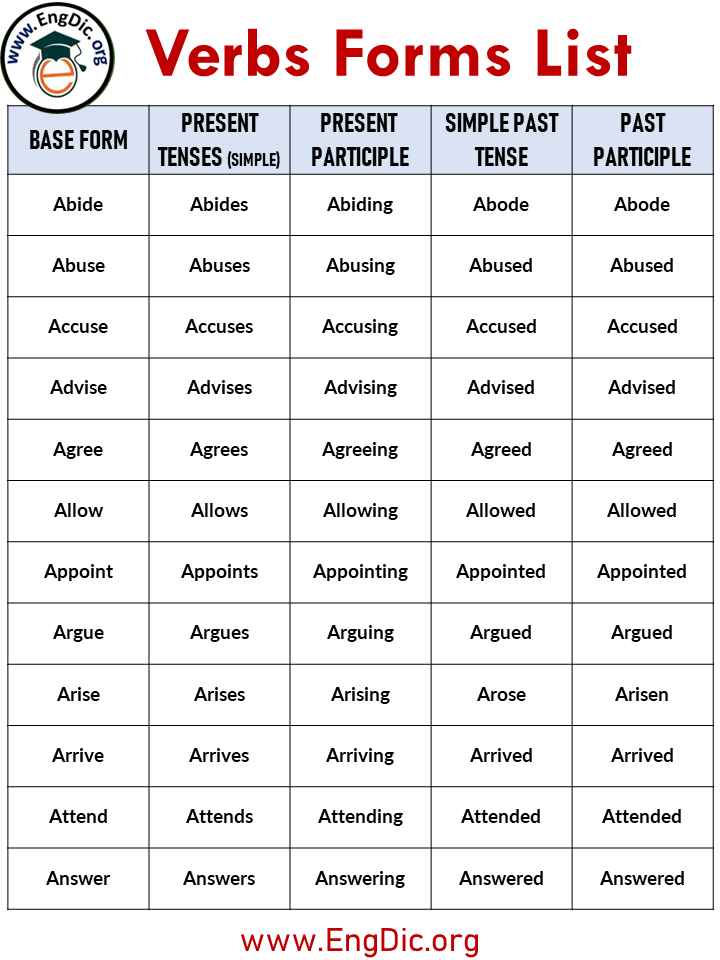
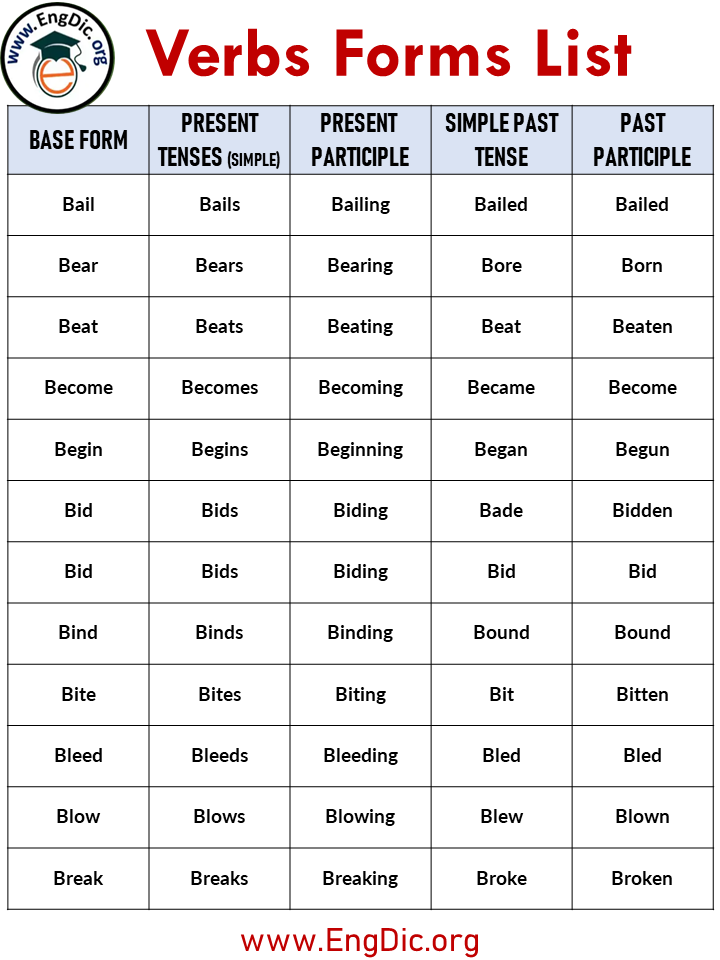

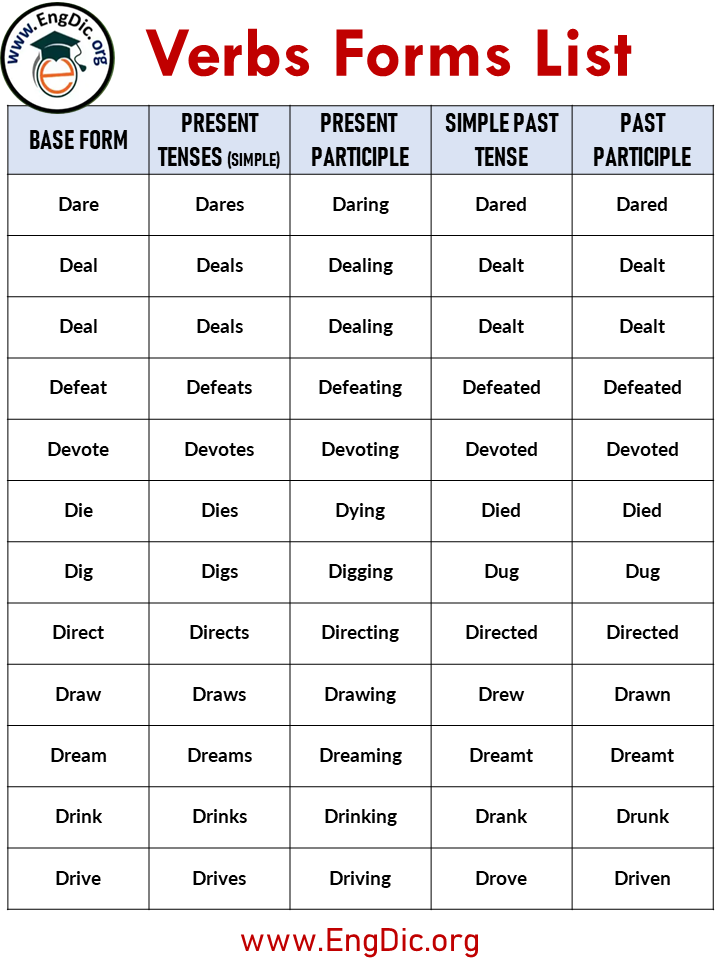

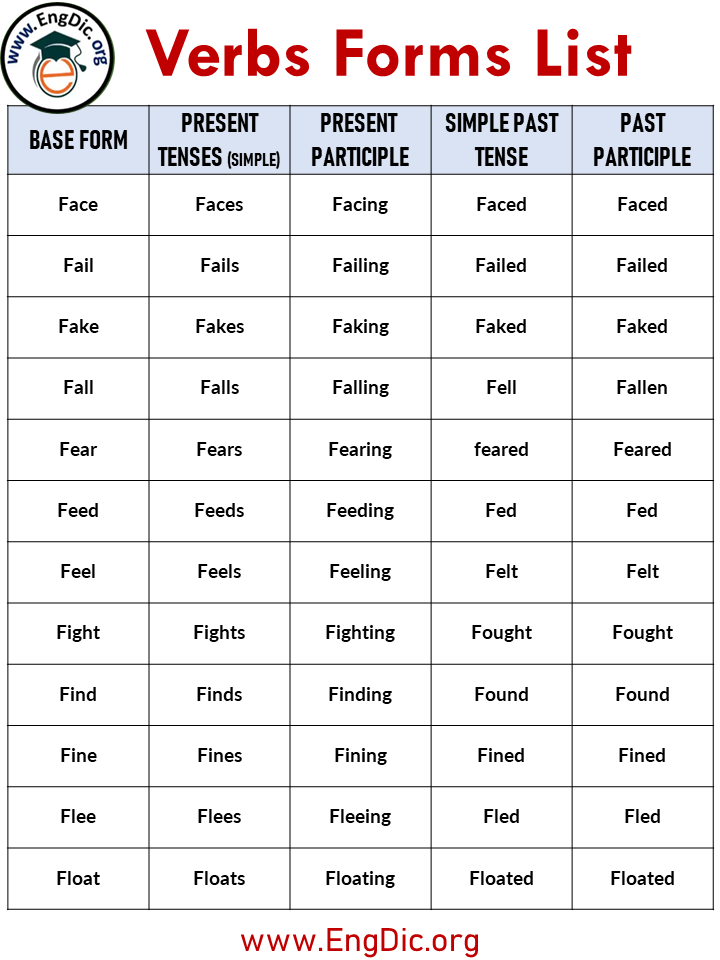

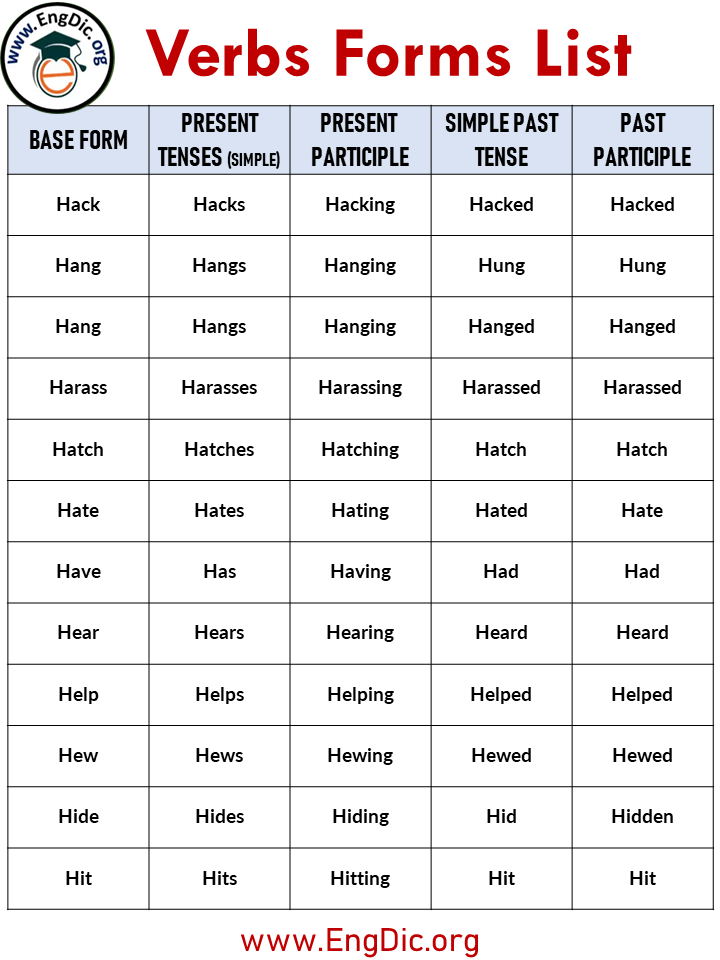
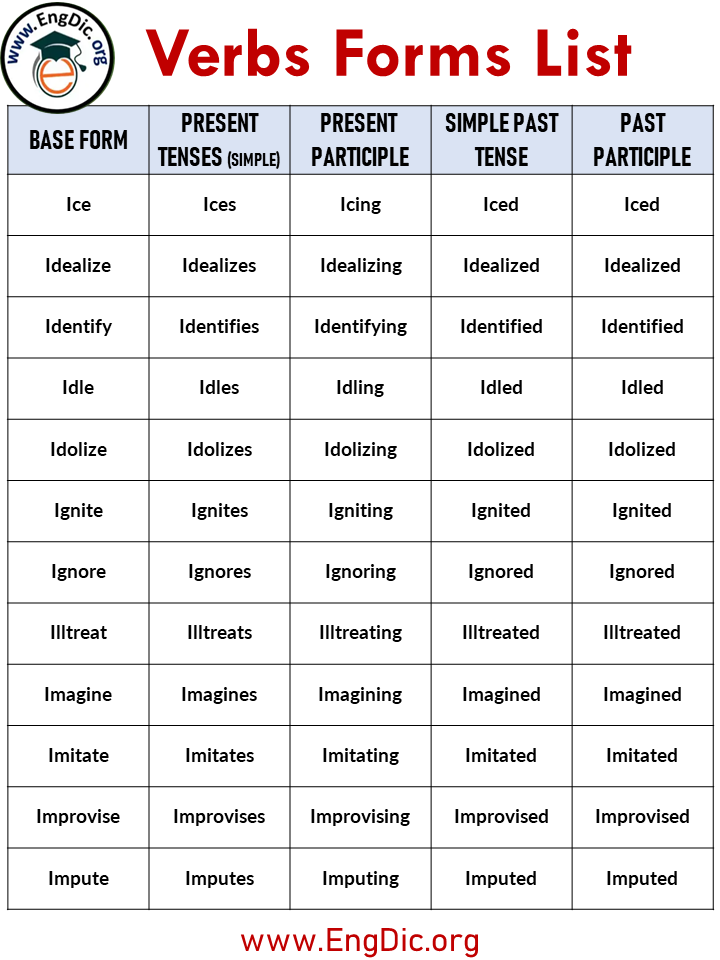
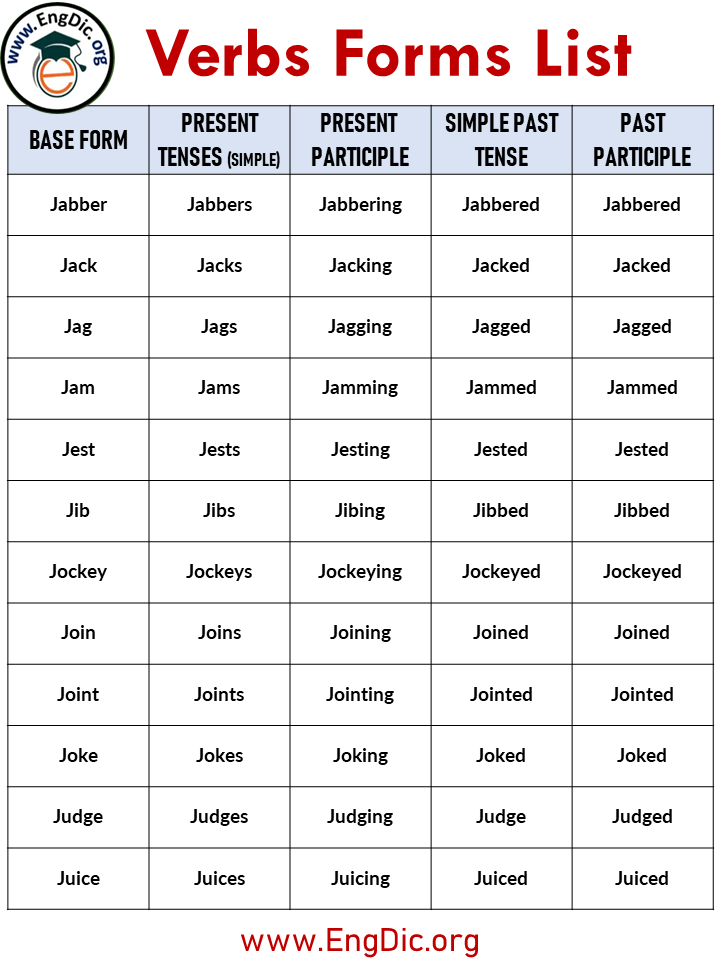



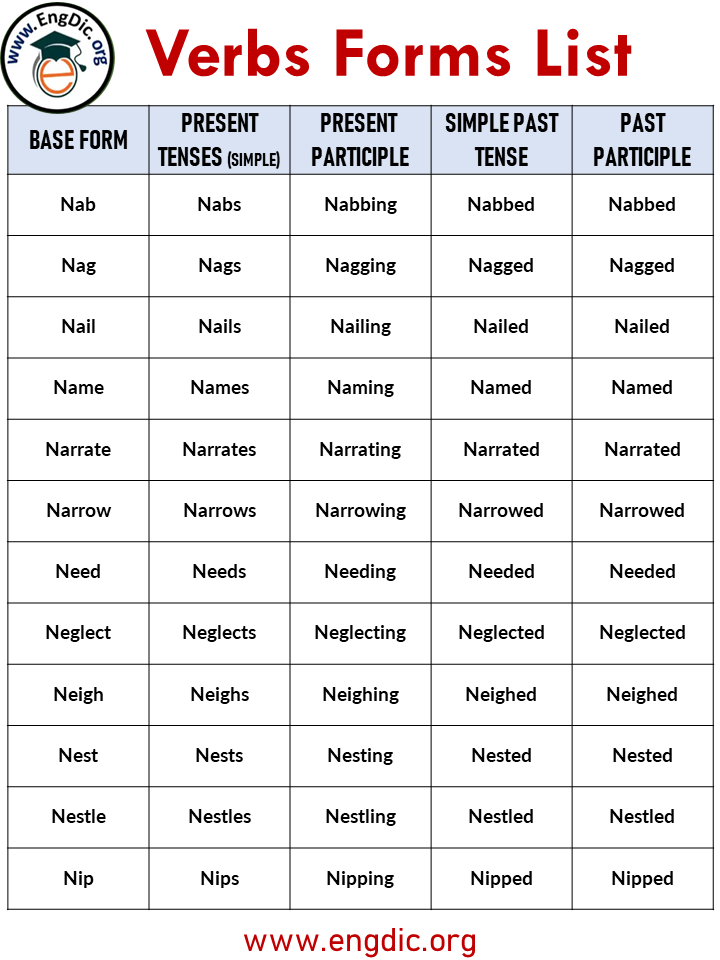


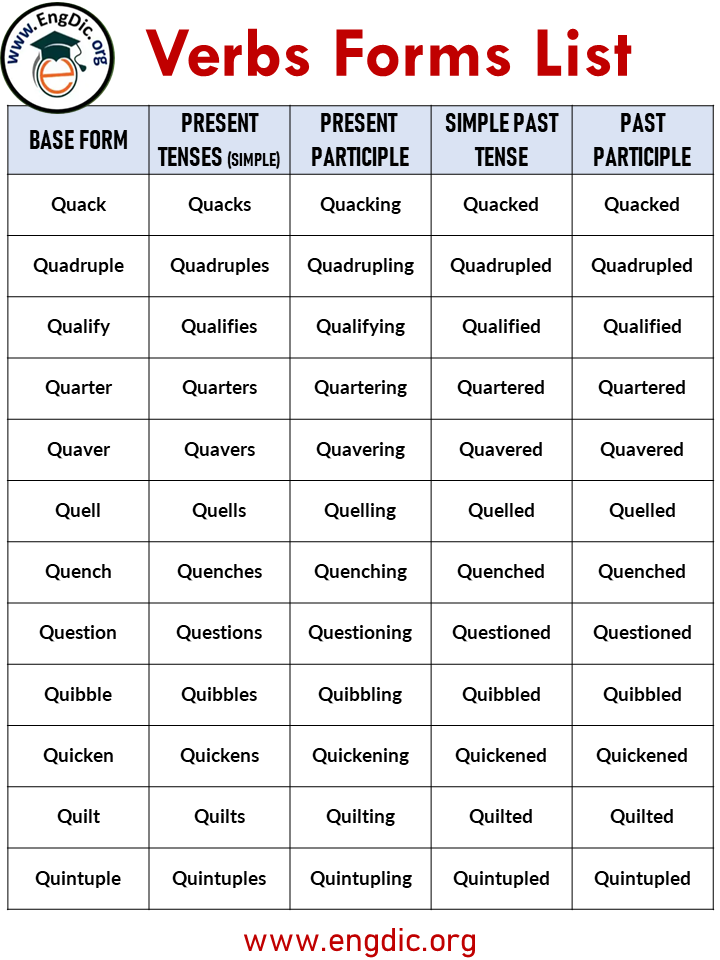



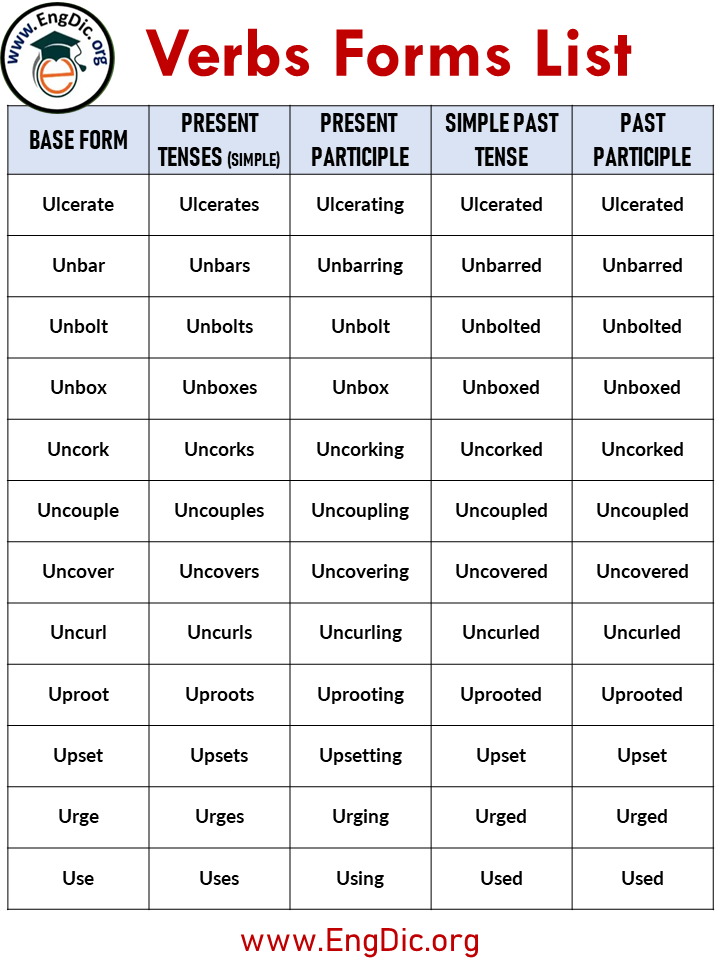


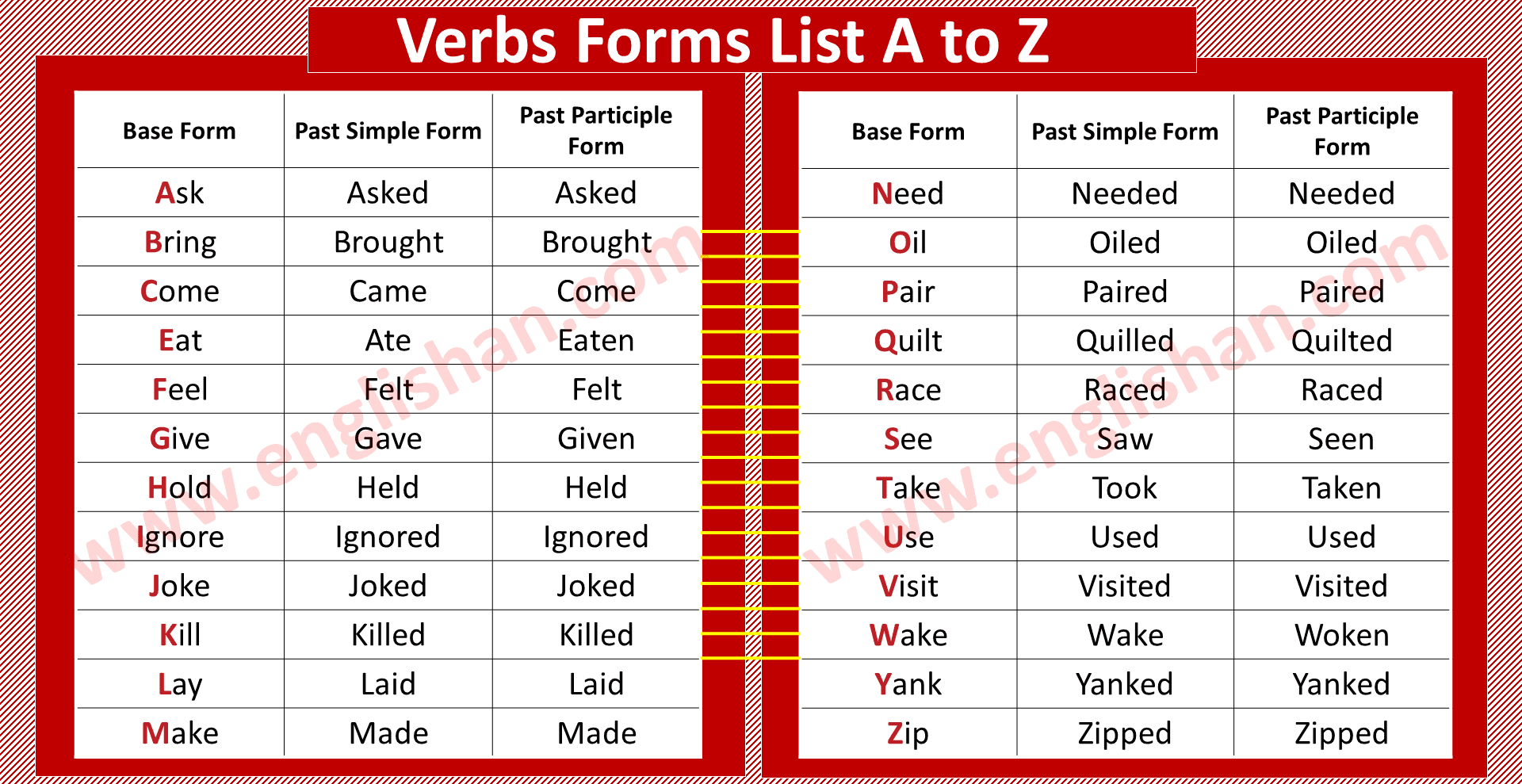

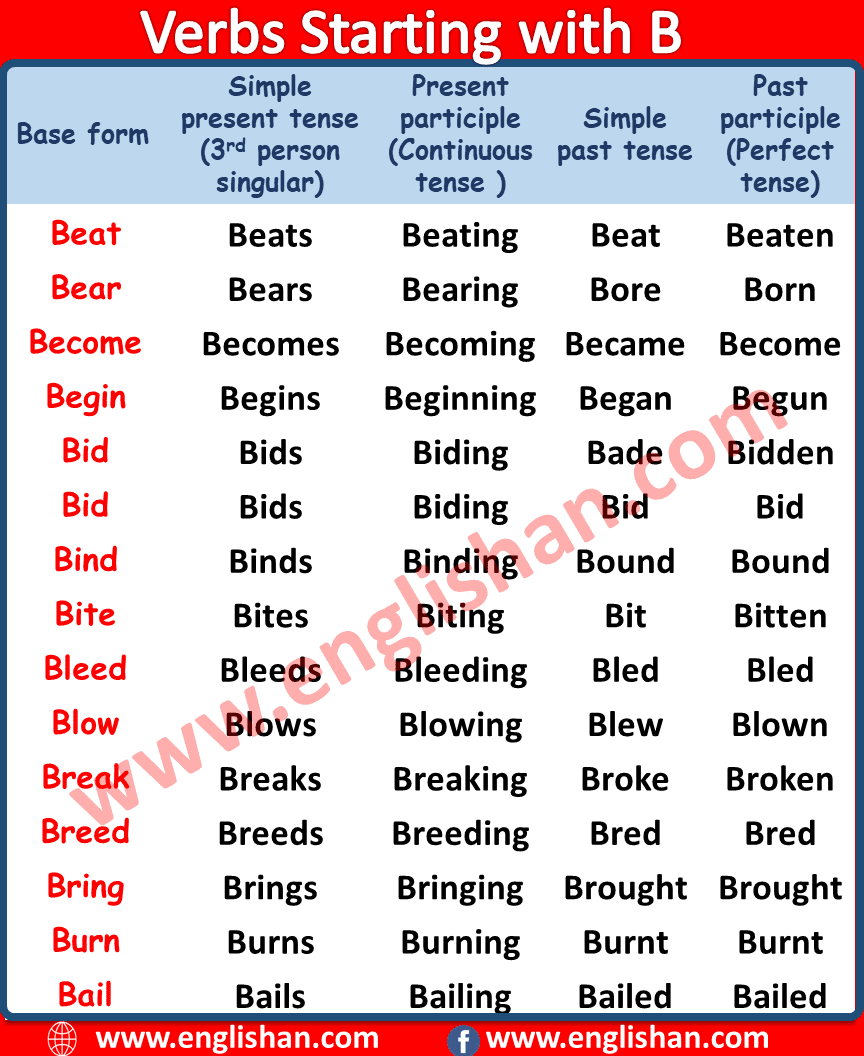
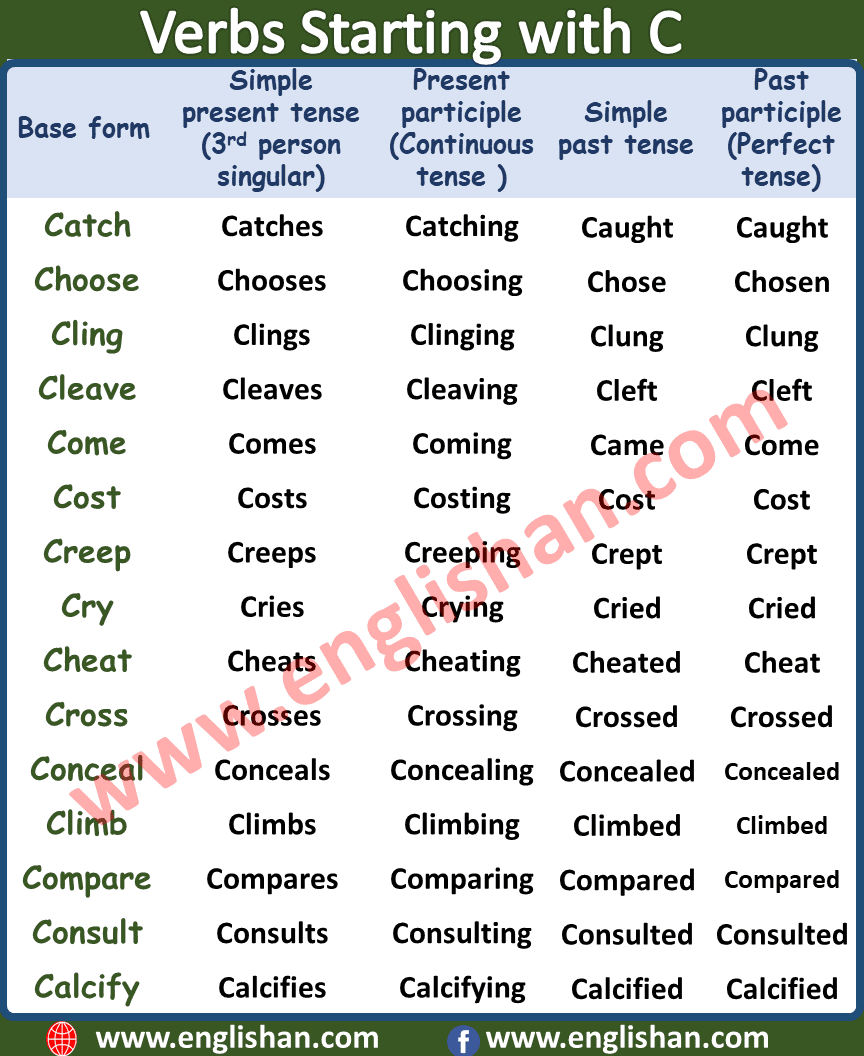
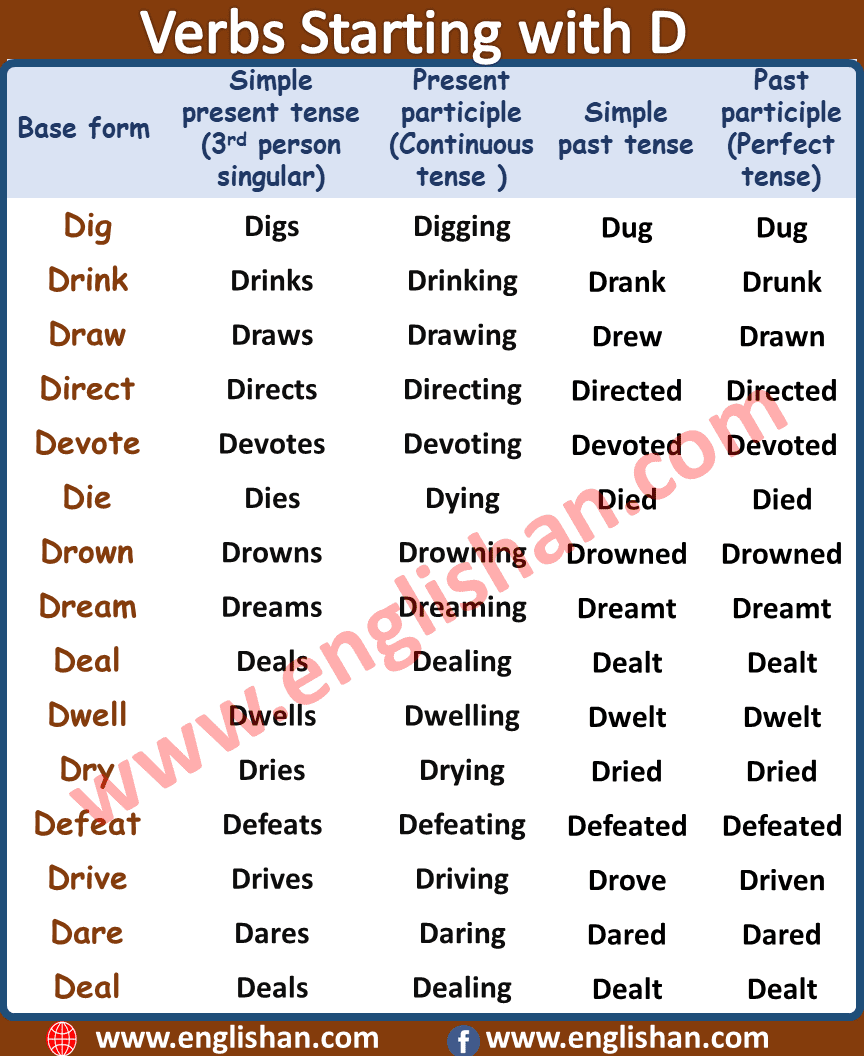
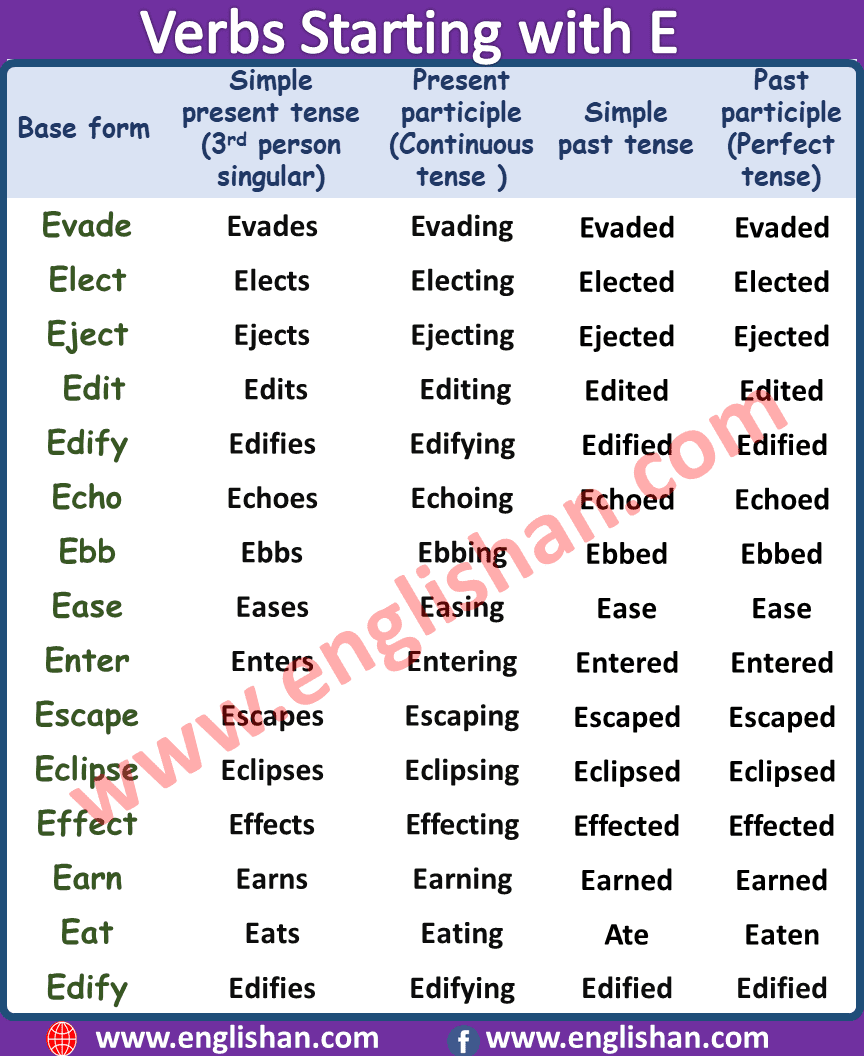
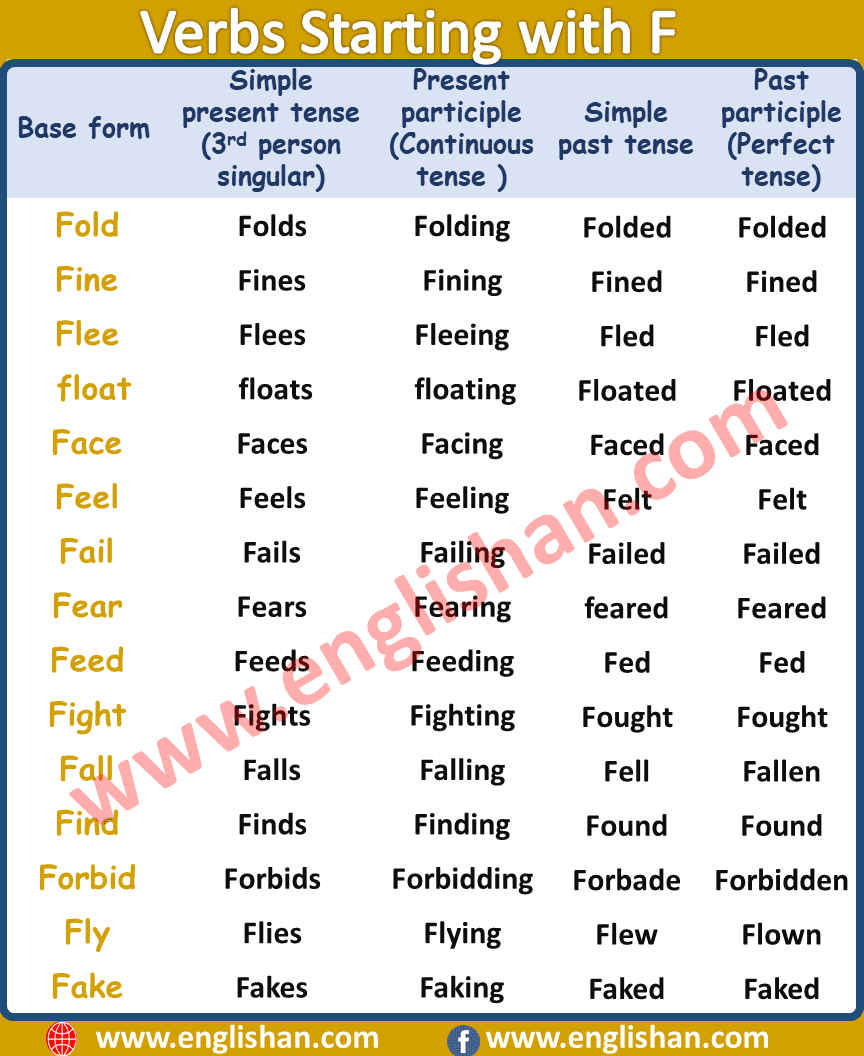
 Verb Starting with H
Verb Starting with H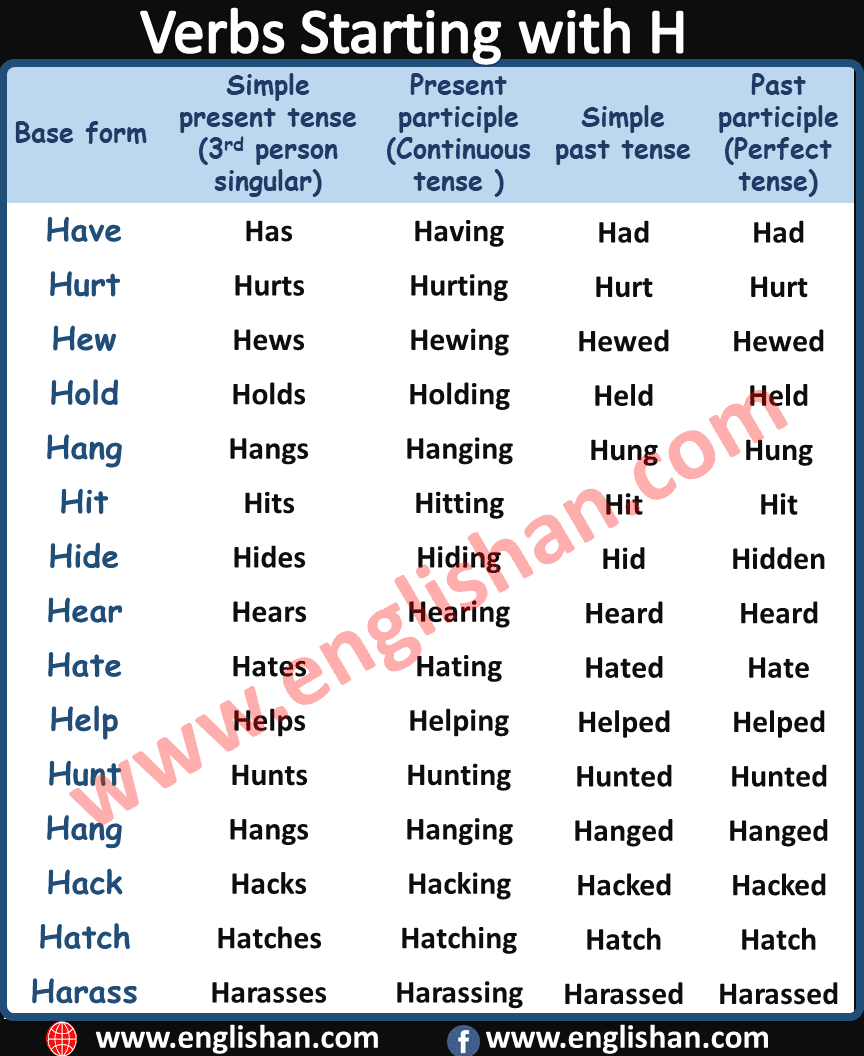 Verb Starting with I
Verb Starting with I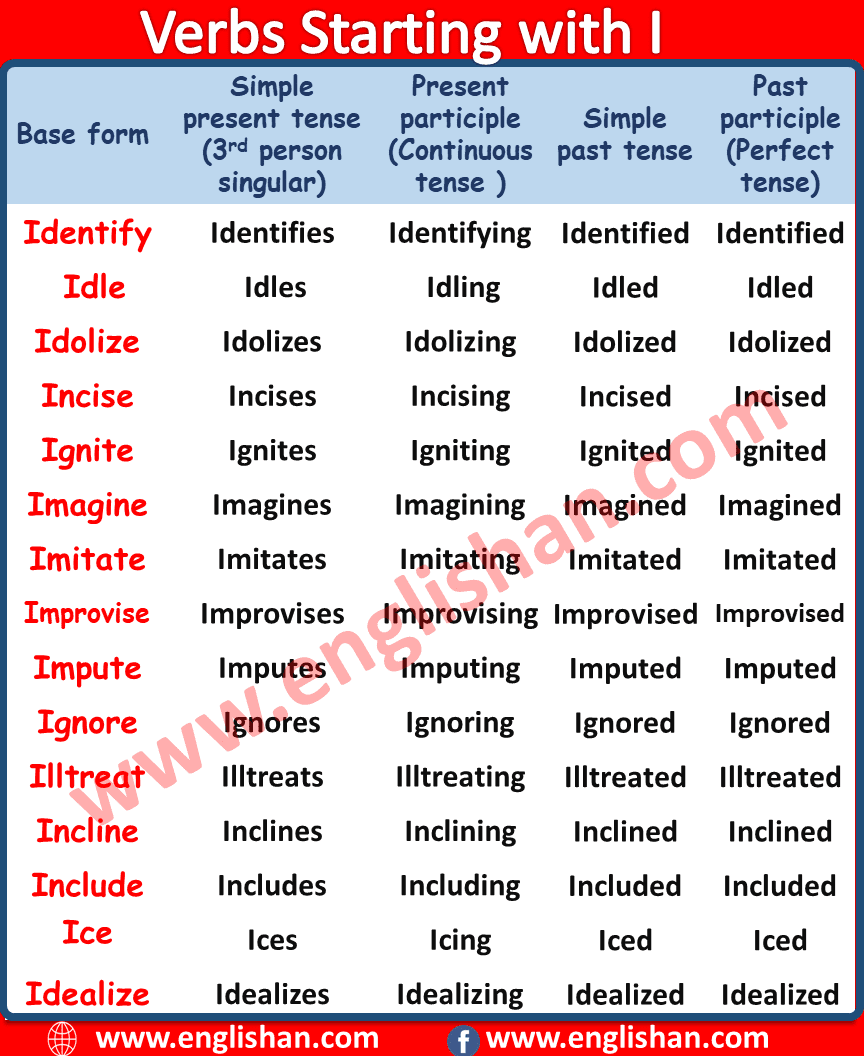 Verb Starting with J
Verb Starting with J